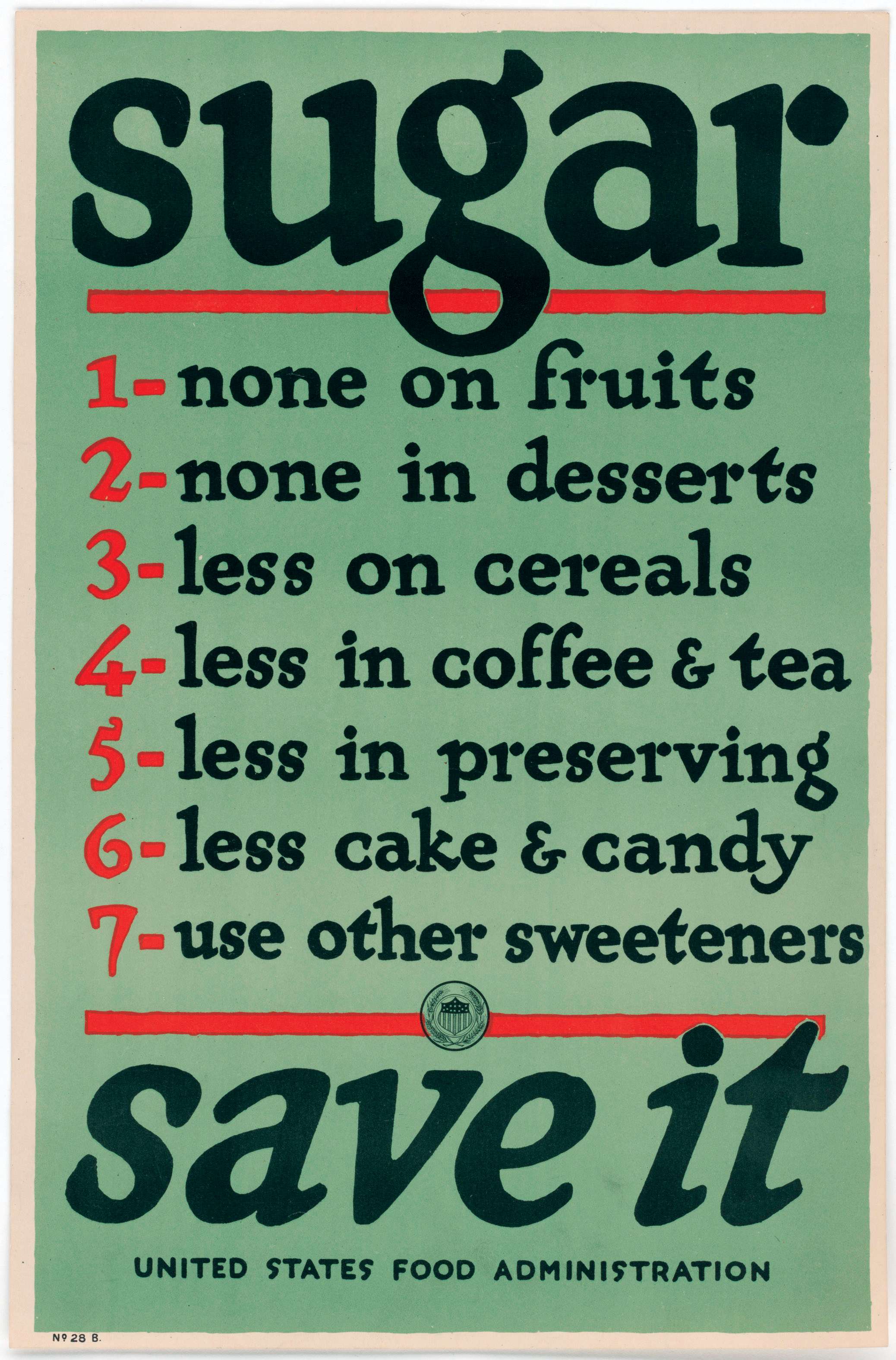Americans on the Homefront Helped Win World War I
Seeing the Big Picture
All documents and text associated with this activity are printed below, followed by a worksheet for student responses.Introduction
Match the documents up according to these 9 ways they could help:- Enlist or support relatives who are fighting
- Buy bonds from the government to help finance the war
- Be loyal to the government and tell on those who aren't
- Work in a wartime industry, even switch from your regular job
- Work instead of staying at home if you're a woman
- Volunteer skills or time to help the nation or soldiers
- Eat more of some things and less or none of others
- Save sugar for the soldiers
- Grow crops to increase the food supply
Click on the orange "open in new window" icon for a larger view of each photograph, document, or poster.
Name:
Class:
Class:
Worksheet
Americans on the Homefront Helped Win World War I
Seeing the Big Picture
Examine the documents and text included in this activity. Consider how each document or piece of text relates to each other and create matched pairs. Write the text or document number next to its match below. Write your conclusion response in the space provided.1
2
3
4
5
6
7
8
9
1
Activity Element

2
Activity Element
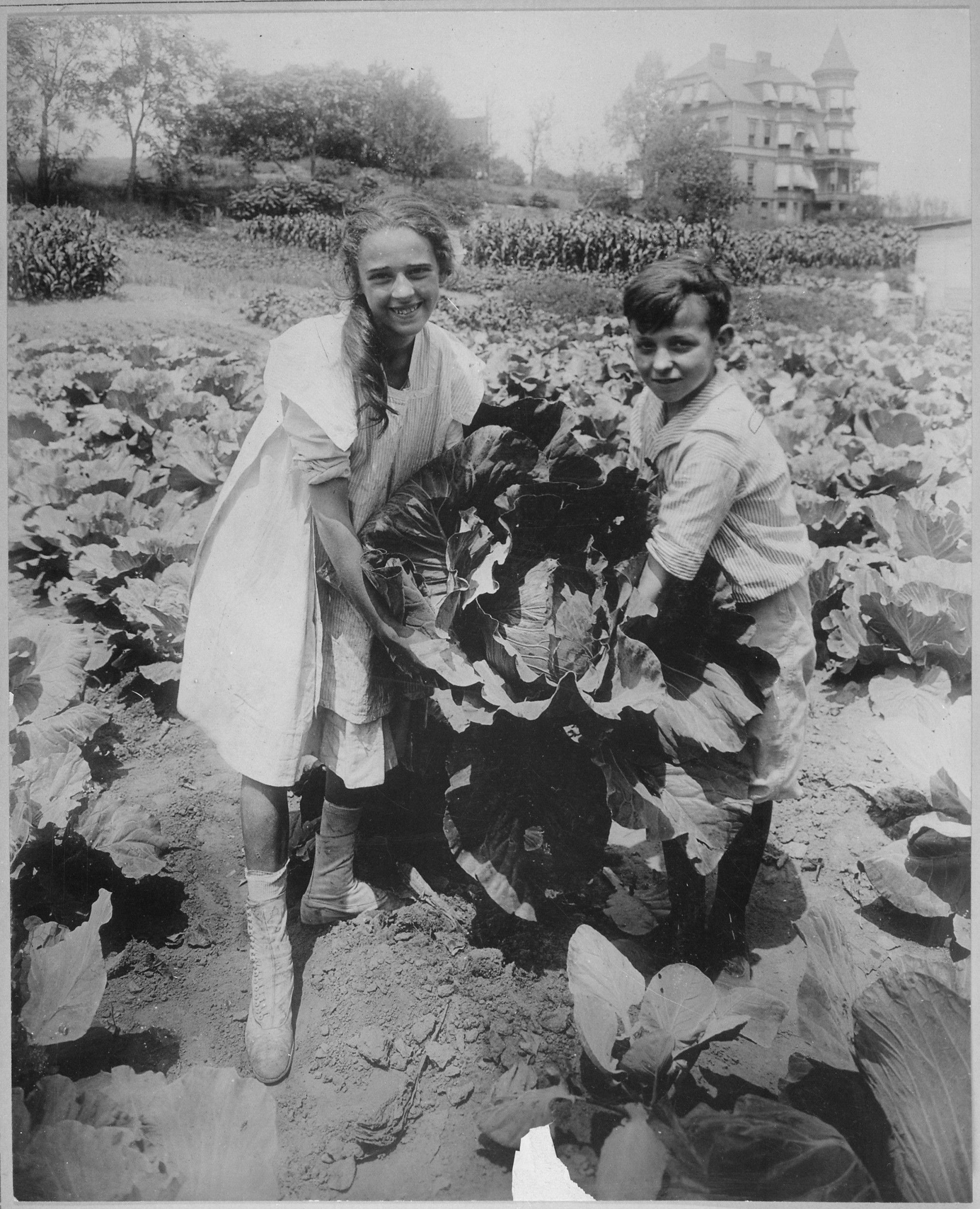
3
Activity Element
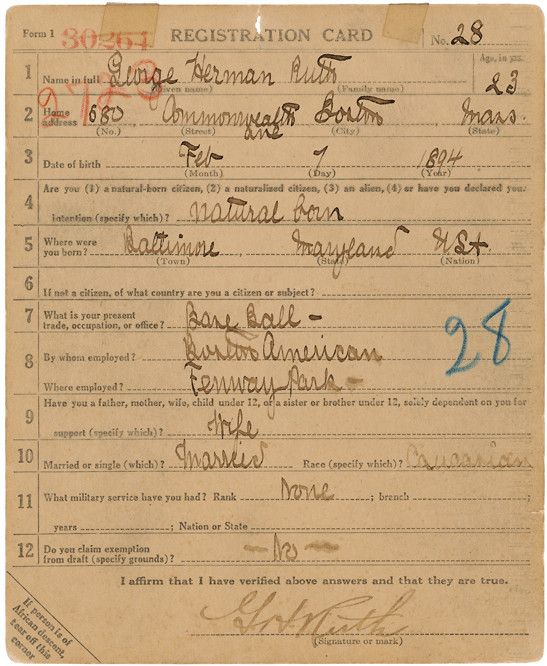
4
Activity Element
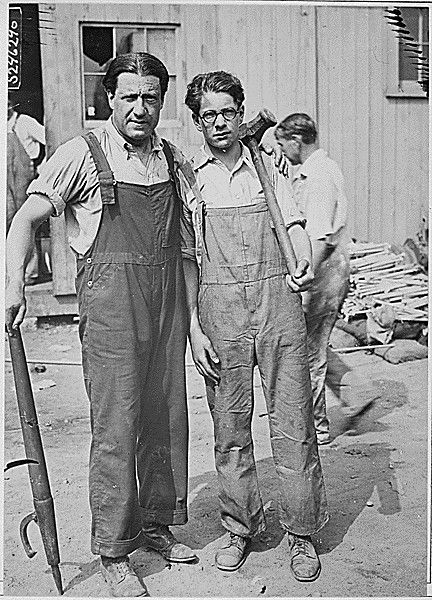
5
Activity Element
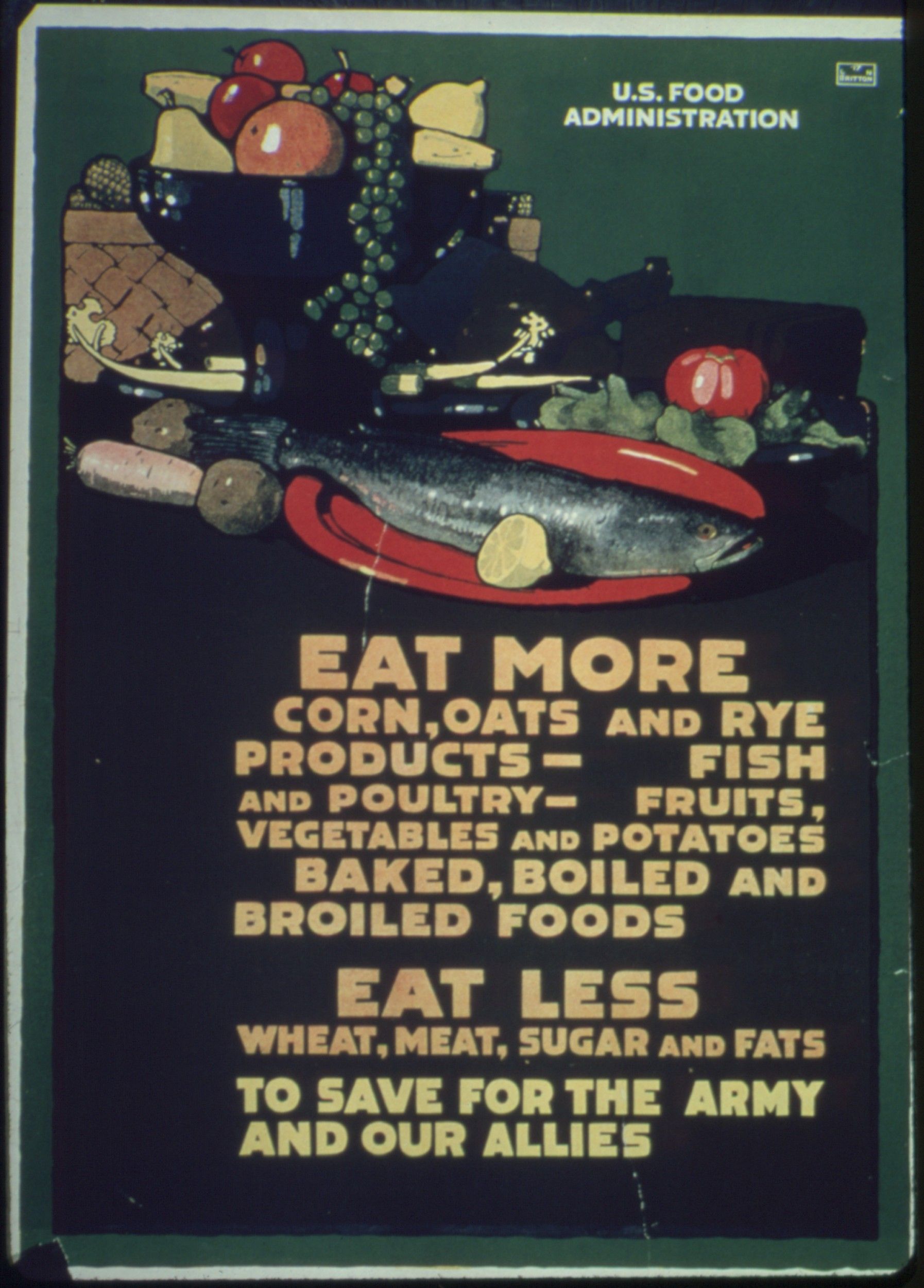
6
Activity Element
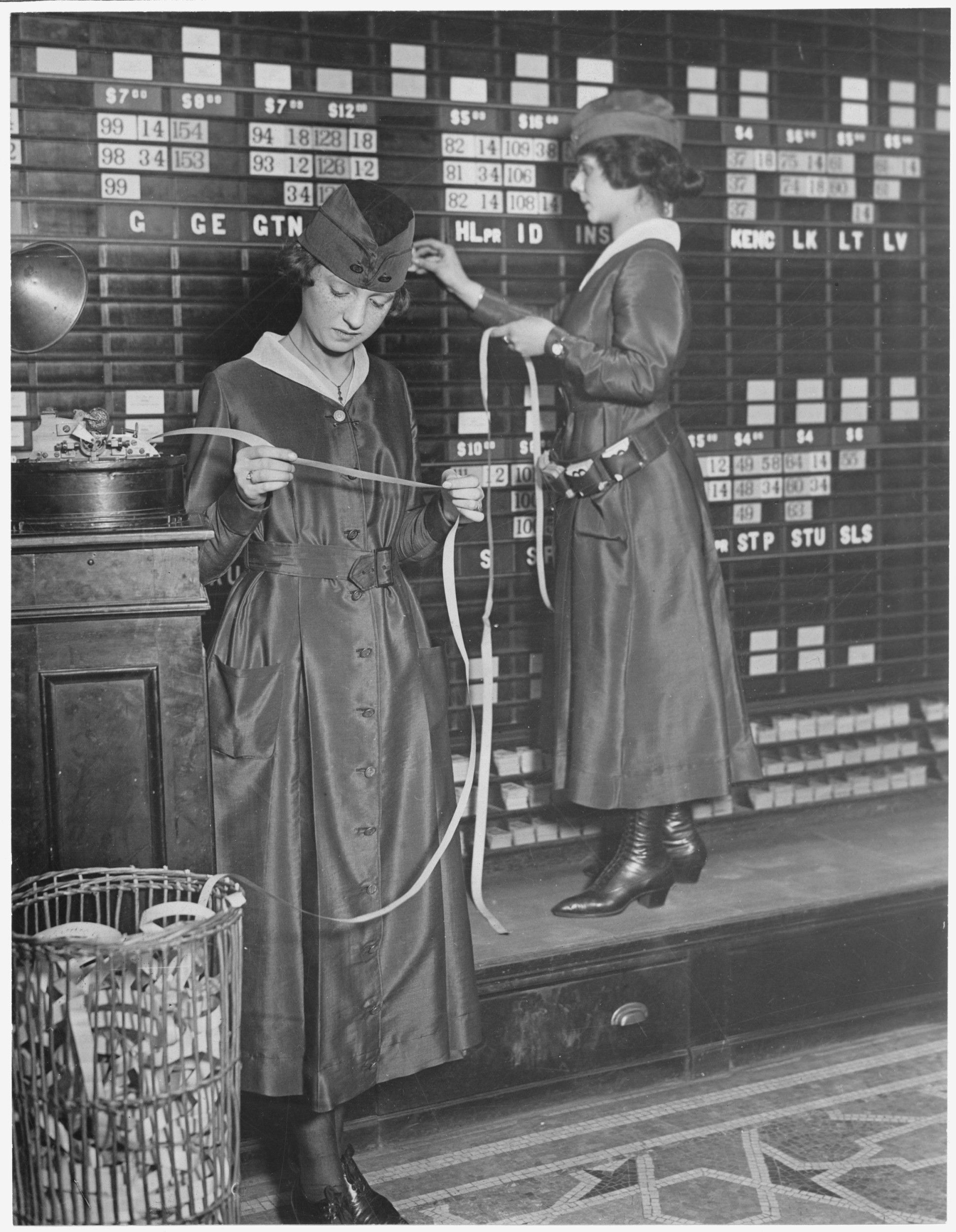
7
Activity Element
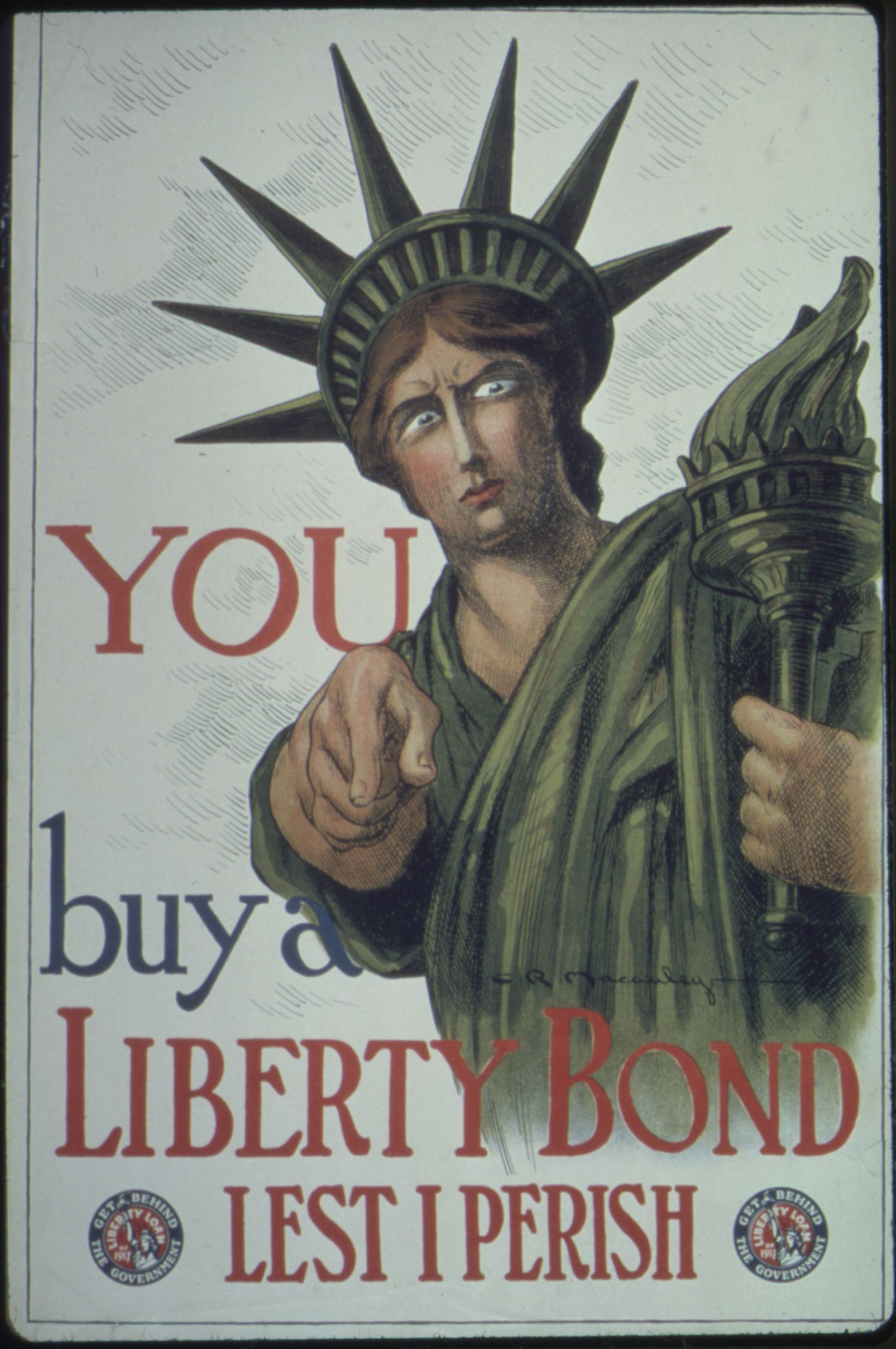
8
Activity Element
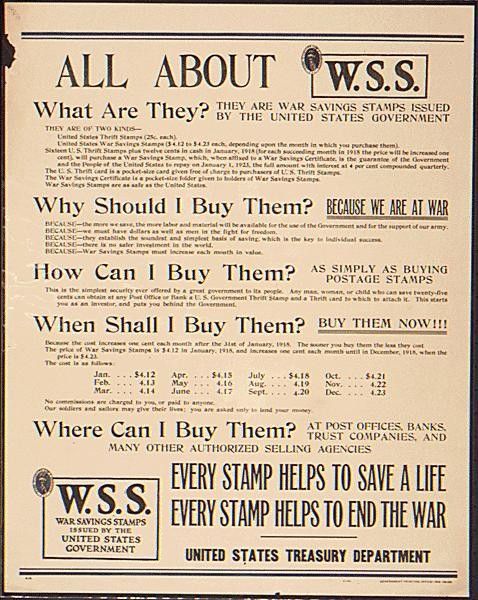
9
Activity Element
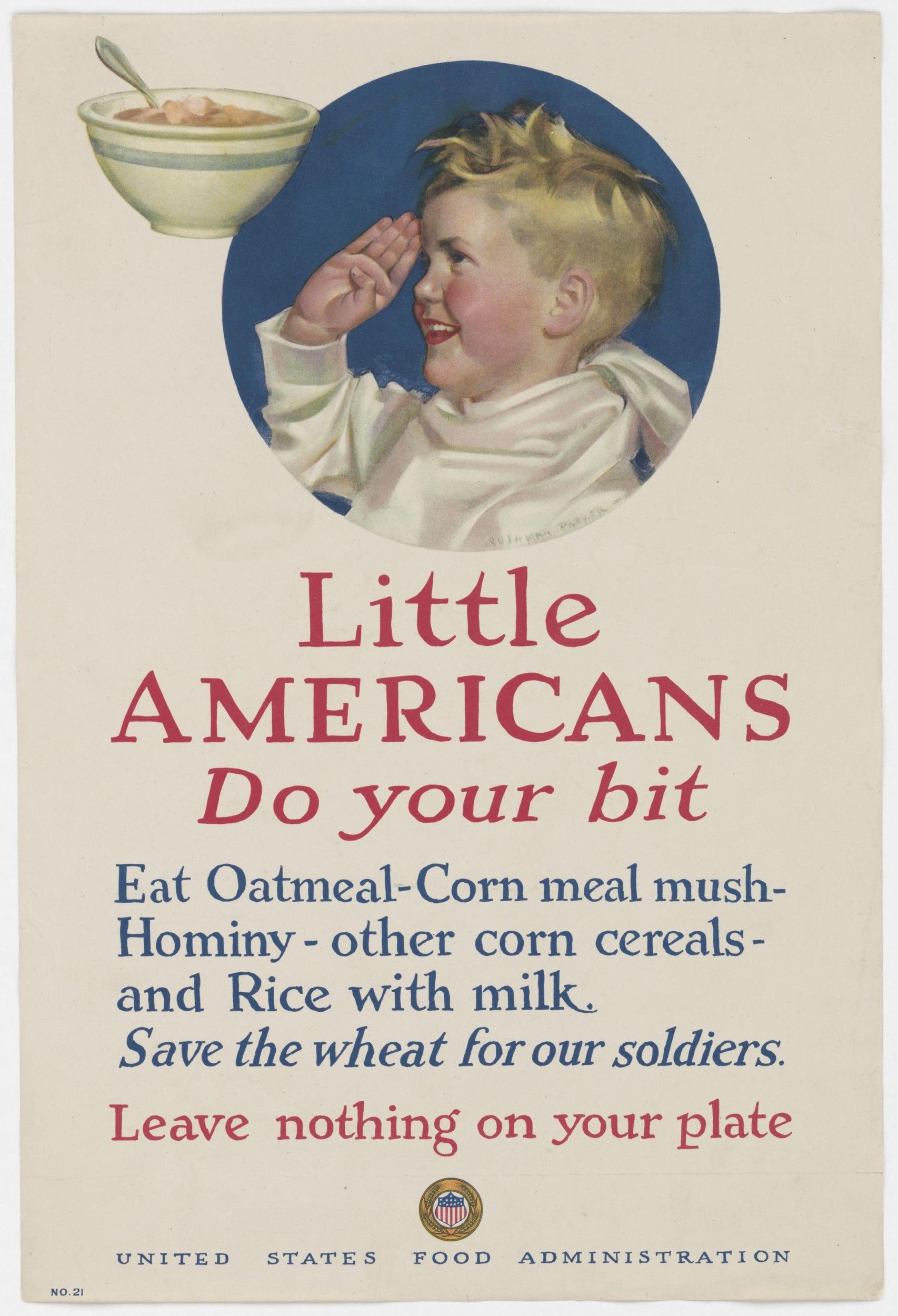
10
Activity Element
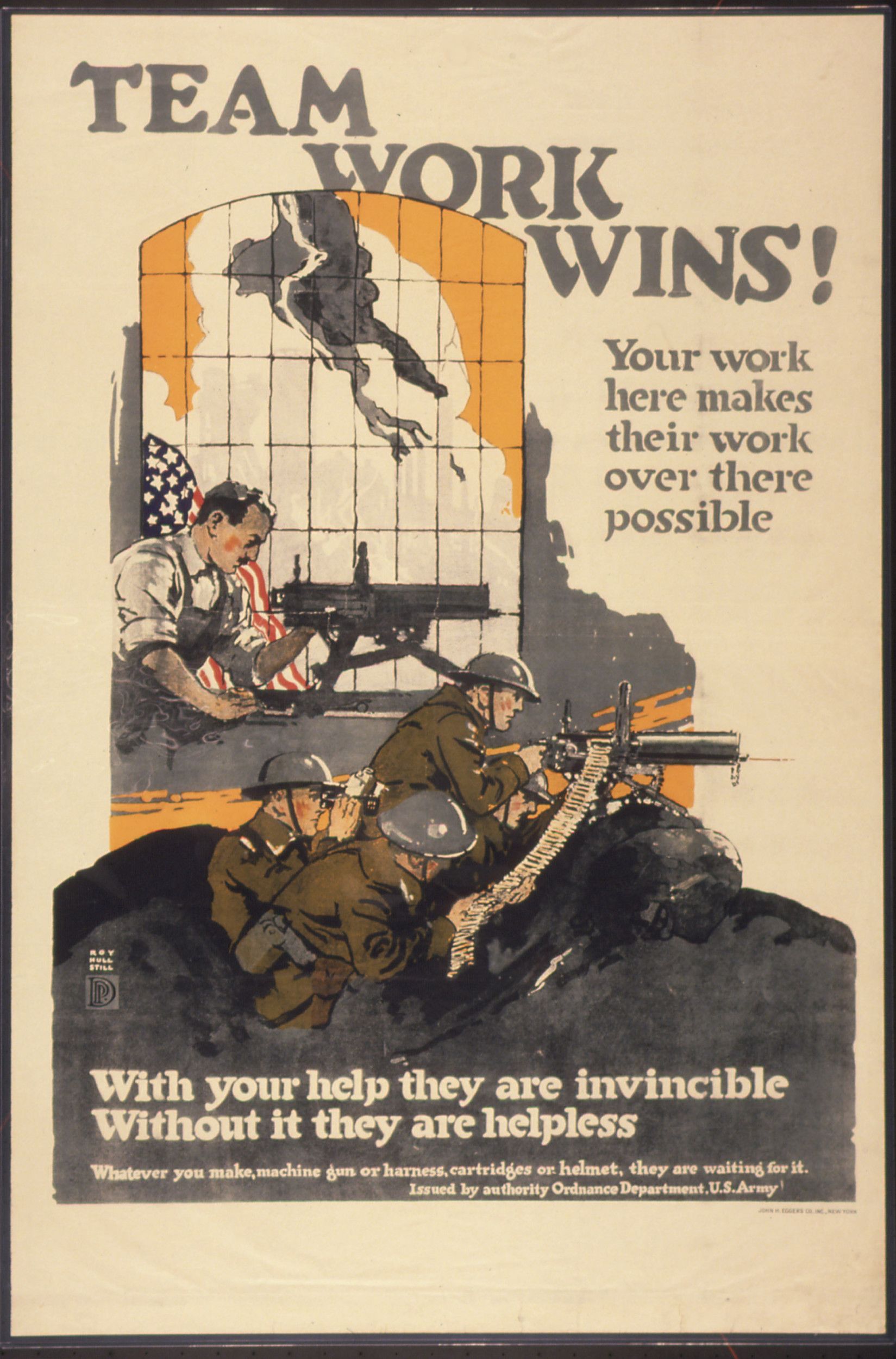
11
Activity Element
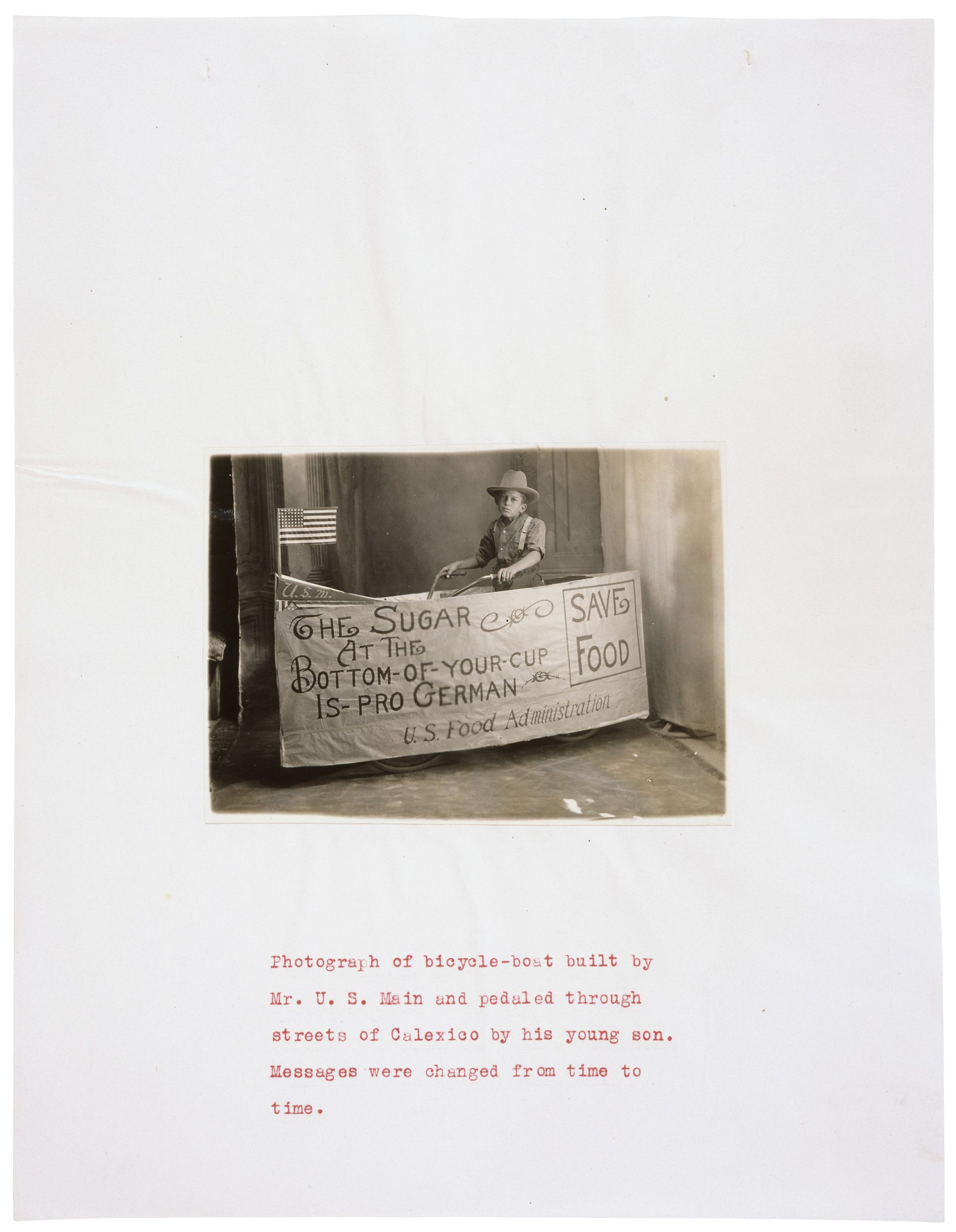
12
Activity Element
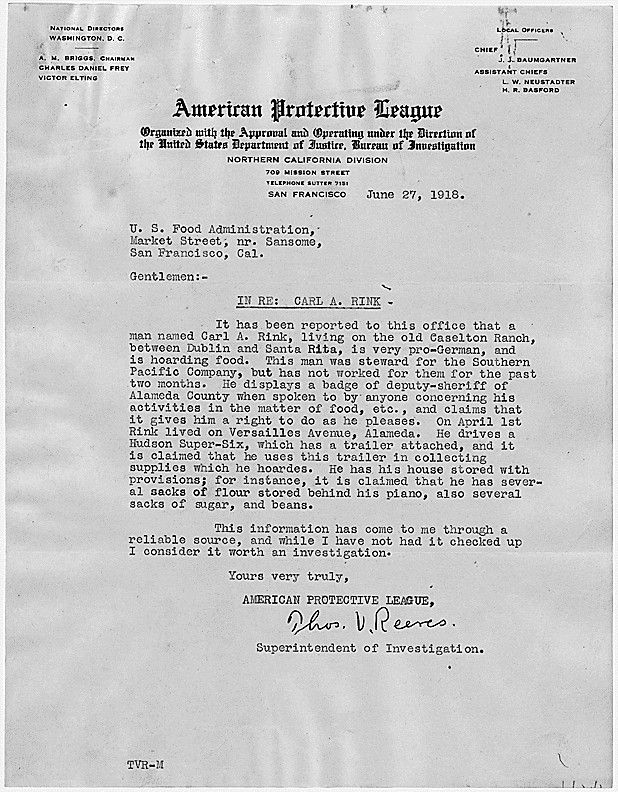
13
Activity Element
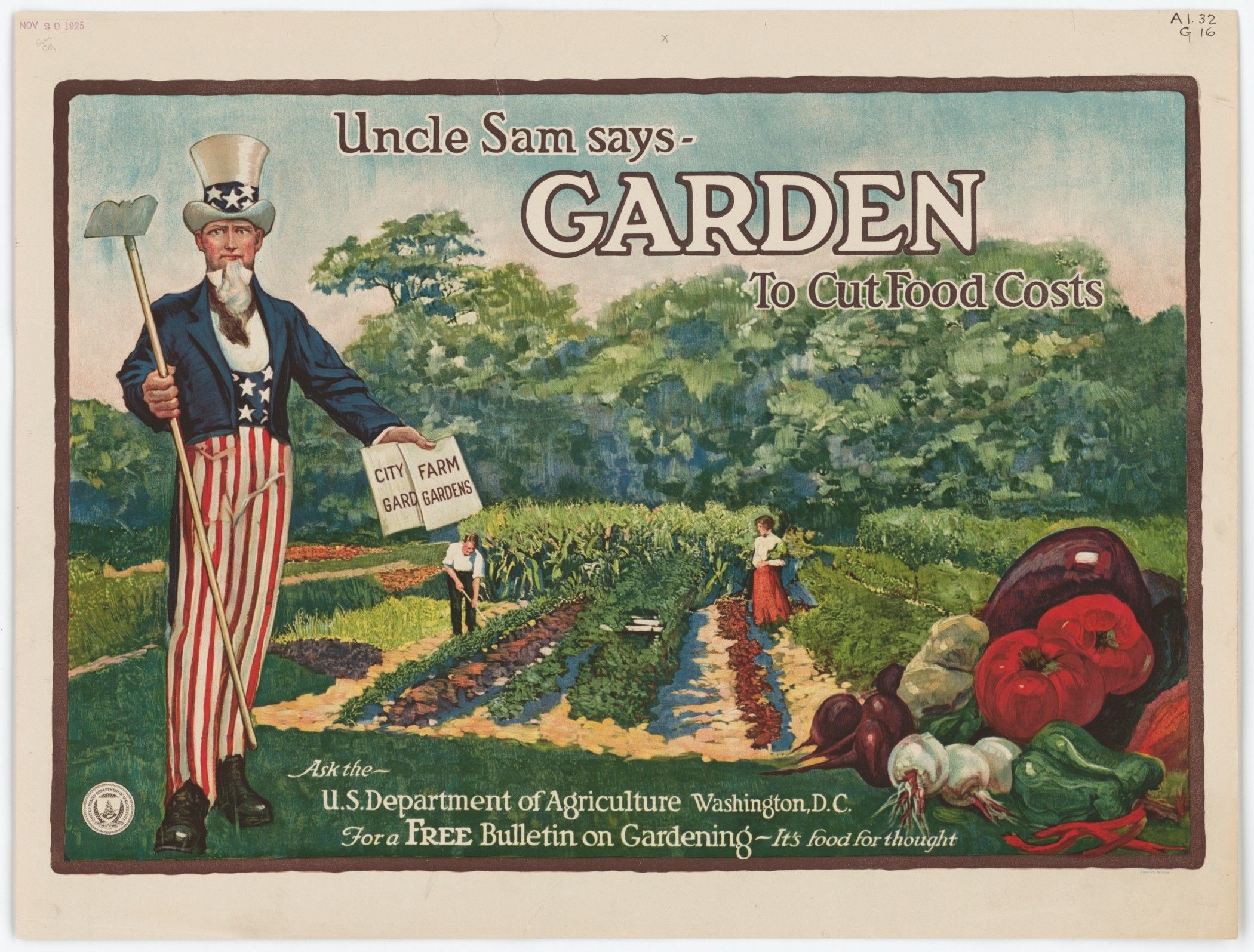
14
Activity Element
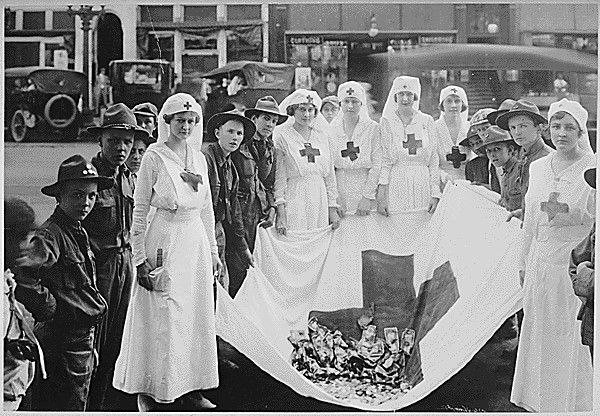
15
Activity Element
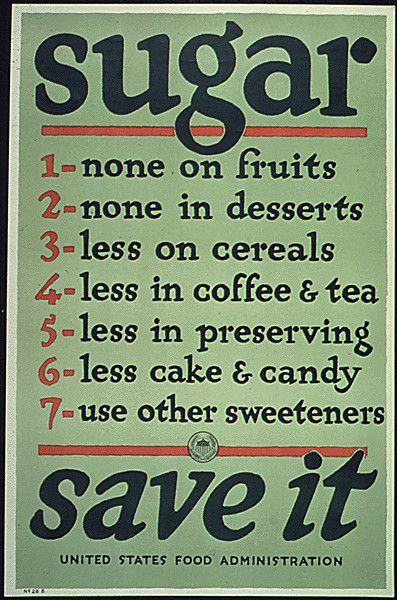
16
Activity Element
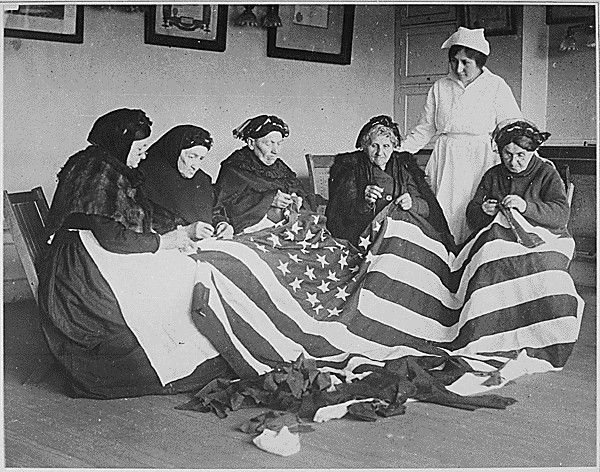
17
Activity Element
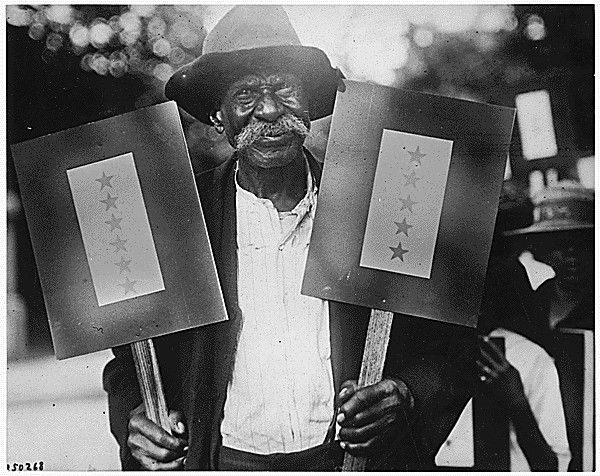
18
Activity Element
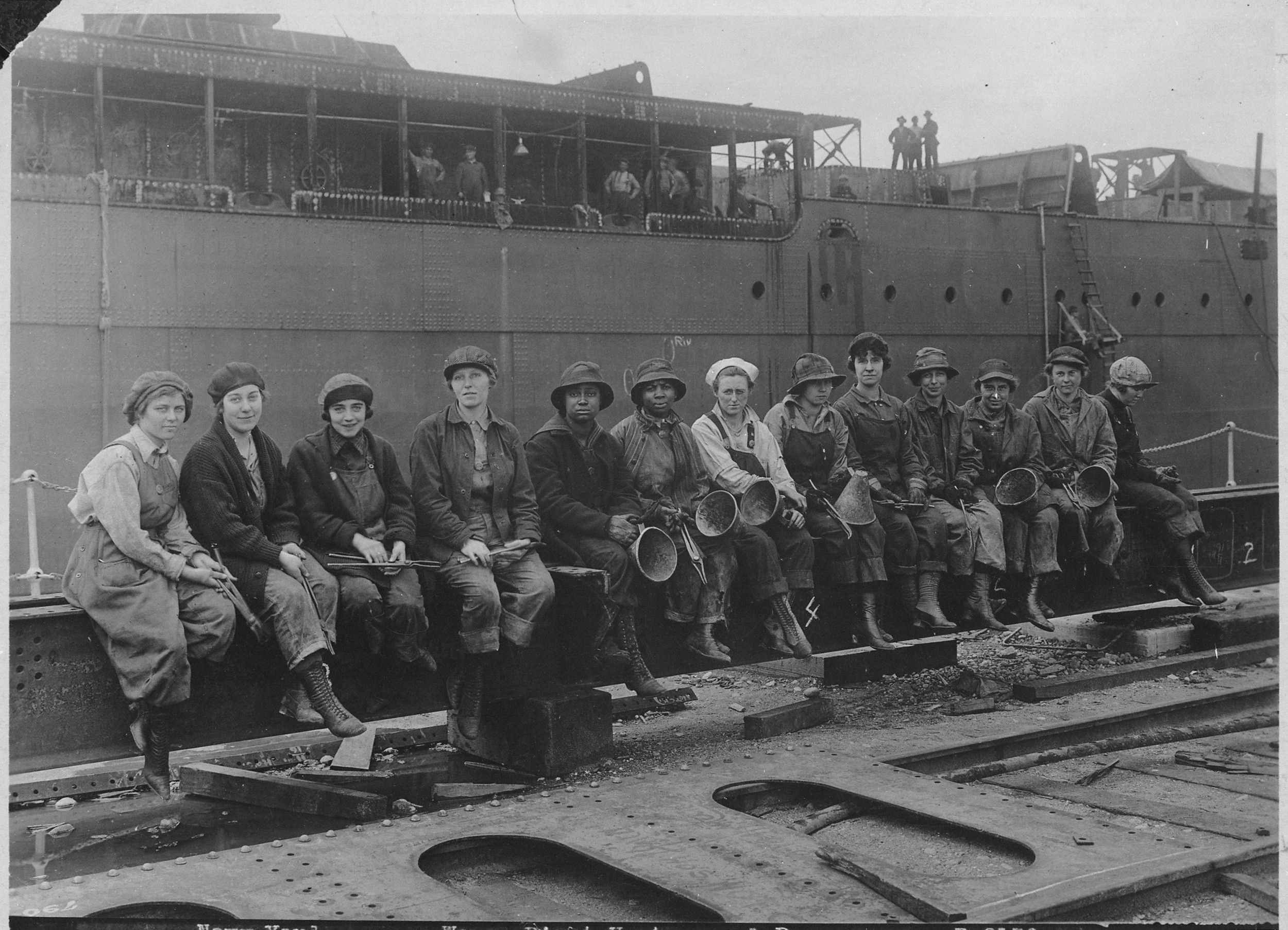
Culminating Document
Armistice celebration. Yanks and Tommies
11/1918
This primary source comes from the Records of the Office of the Chief Signal Officer.
National Archives Identifier: 530789
Full Citation: Photograph 111-SC-50086; Armistice celebration. Yanks and Tommies; 11/1918; Photographs of American Military Activities, ca. 1918 - ca. 1981; Records of the Office of the Chief Signal Officer, ; National Archives at College Park, College Park, MD. [Online Version, https://docsteach.org/documents/document/armistice-yanks-tommies, April 23, 2024]Armistice celebration. Yanks and Tommies
Page 1
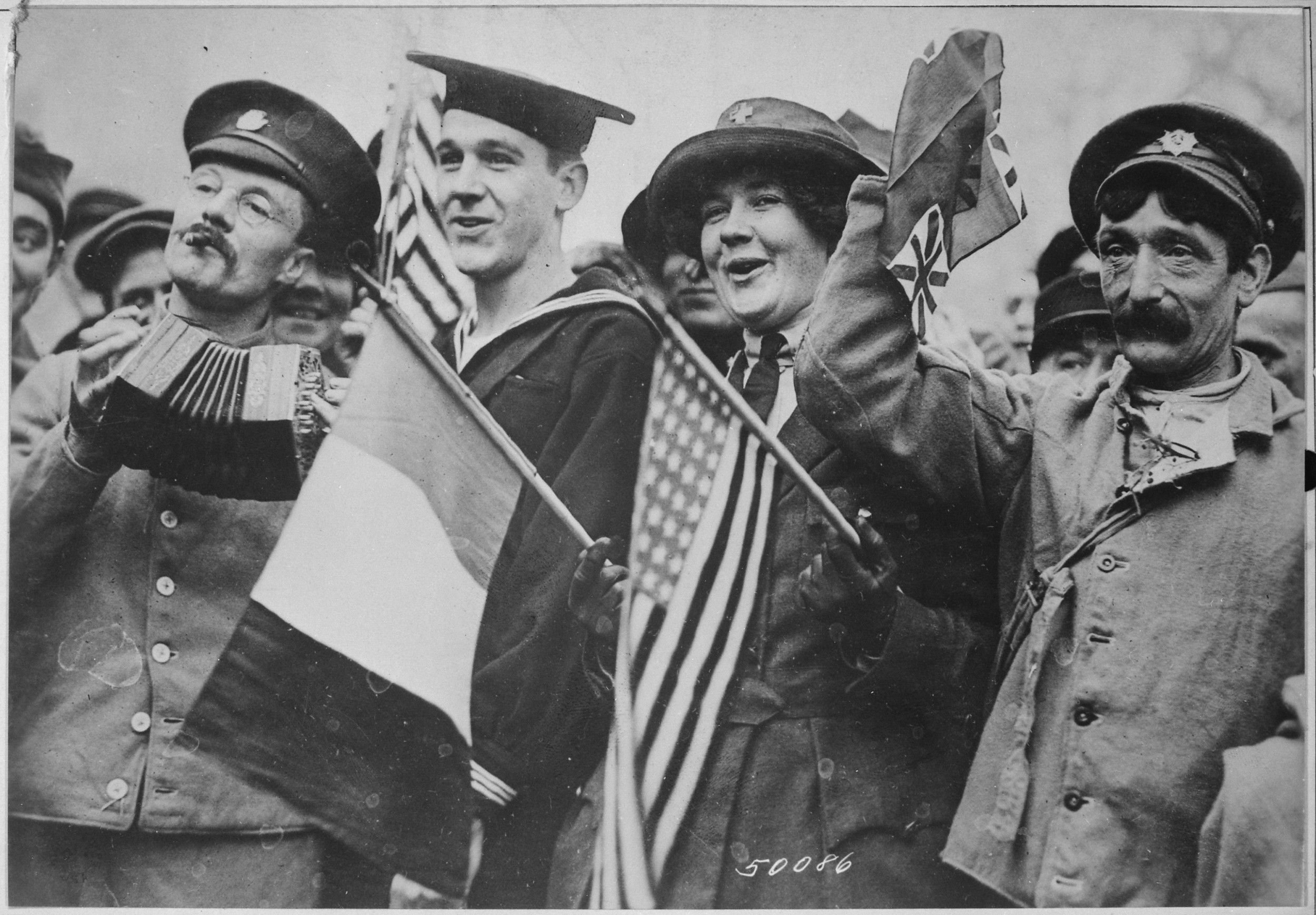
Conclusion
Americans on the Homefront Helped Win World War I
Seeing the Big Picture
The Allies celebrated the end of fighting on Nov.11, 1918. Armistice Day became a U.S. holiday, now called Veterans Day. The Department of Veterans Affairs states the purpose of Veterans Day is "to honor America's veterans for their patriotism, love of country, and willingness to serve and sacrifice for the common good."Do citizens owe their country sacrifices? How much did Americans sacrifice on the home-front during WWI?
Your Response
Document
American Red Cross Parade, Birmingham, Alabama. Birmingham View Company
5/21/1918
This primary source comes from the Records of the War Department General and Special Staffs.
National Archives Identifier: 533466
Full Citation: American Red Cross Parade, Birmingham, Alabama. Birmingham View Company; 5/21/1918; Records of the War Department General and Special Staffs, . [Online Version, https://docsteach.org/documents/document/american-red-cross-parade-birmingham-alabama, April 23, 2024]American Red Cross Parade, Birmingham, Alabama. Birmingham View Company
Page 1
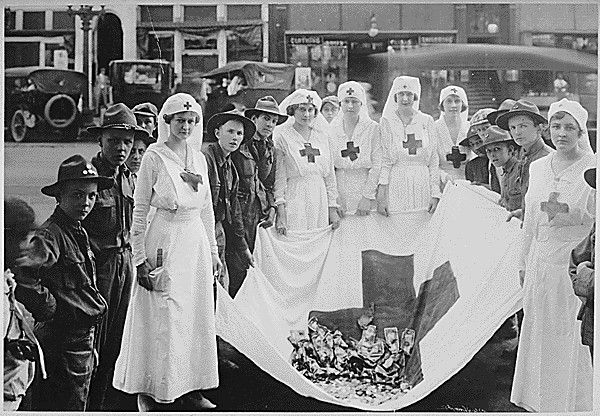
Document
Patriotic old women make flags. Born in Hungary, Galicia, Russia, Germany, Rumania. Their flag-making instructor, Rose Radin, is standing. Underwood and Underwood
ca. 1918
This primary source comes from the Records of the War Department General and Special Staffs.
National Archives Identifier: 533657
Full Citation: Patriotic old women make flags. Born in Hungary, Galicia, Russia, Germany, Rumania. Their flag-making instructor, Rose Radin, is standing. Underwood and Underwood; ca. 1918; Records of the War Department General and Special Staffs, . [Online Version, https://docsteach.org/documents/document/patriotic-old-women-make-flags-born-in-hungary-galicia-russia-germany-rumania-their-flagmaking-instructor-rose-radin-is-standing-underwood-and-underwood, April 23, 2024]Patriotic old women make flags. Born in Hungary, Galicia, Russia, Germany, Rumania. Their flag-making instructor, Rose Radin, is standing. Underwood and Underwood
Page 1
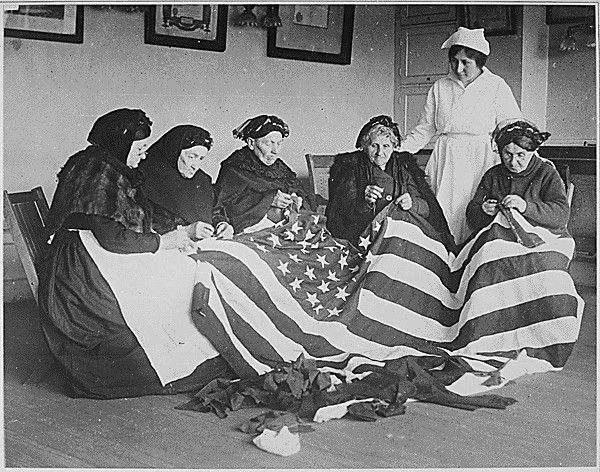
Document
John Meints, punished during World War I
ca. 1917 - 1918
Meintz was tarred and feathered by residents of Minnesota for not supporting war bond drives during World War I. Included in the file for his court case, Meints v. Huntington, are front and rear views of Meints, showing feathers stuck on his body. Meints had brought suit against his abusers for his treatment.
This primary source comes from the Records of District Courts of the United States.
National Archives Identifier: 283633
Full Citation: John Meints, punished during World War I; ca. 1917 - 1918; John Meints v. O.R. Huntington, et. al; Law Case Files, 1898 - 1938; Records of District Courts of the United States, ; National Archives at Kansas City, Kansas City, MO. [Online Version, https://docsteach.org/documents/document/meints-wwi-front, April 23, 2024]John Meints, punished during World War I
Page 2
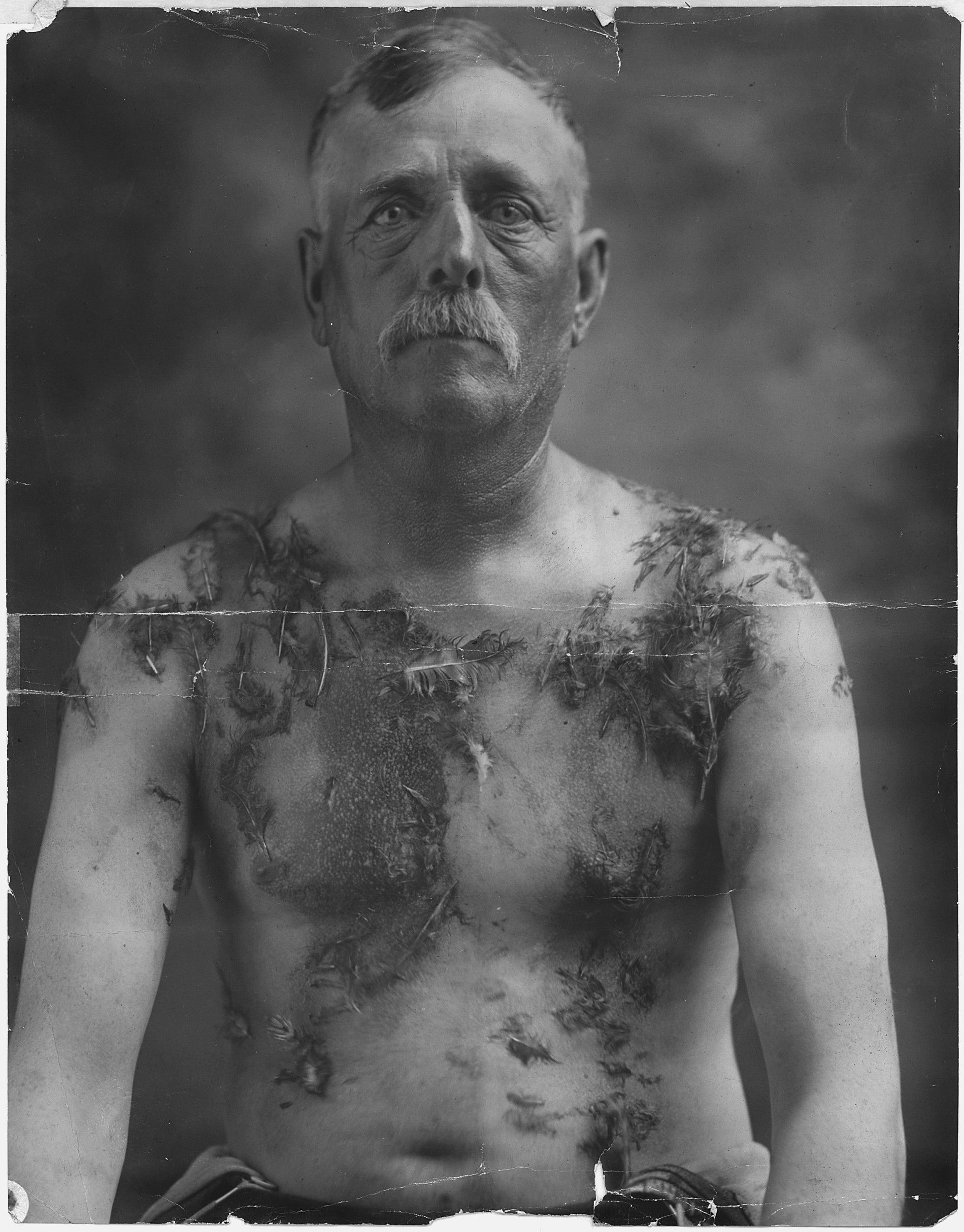
Document
American Protective League to U. S. Food Administration re: Carl A. Rink
6/27/1918
This primary source comes from the Records of the U.S. Food Administration.
National Archives Identifier: 295923
Full Citation: American Protective League to U. S. Food Administration re: Carl A. Rink; 6/27/1918; Records of the U.S. Food Administration, . [Online Version, https://docsteach.org/documents/document/american-protective-league-to-u-s-food-administration-re-carl-a-rink, April 23, 2024]American Protective League to U. S. Food Administration re: Carl A. Rink
Page 1
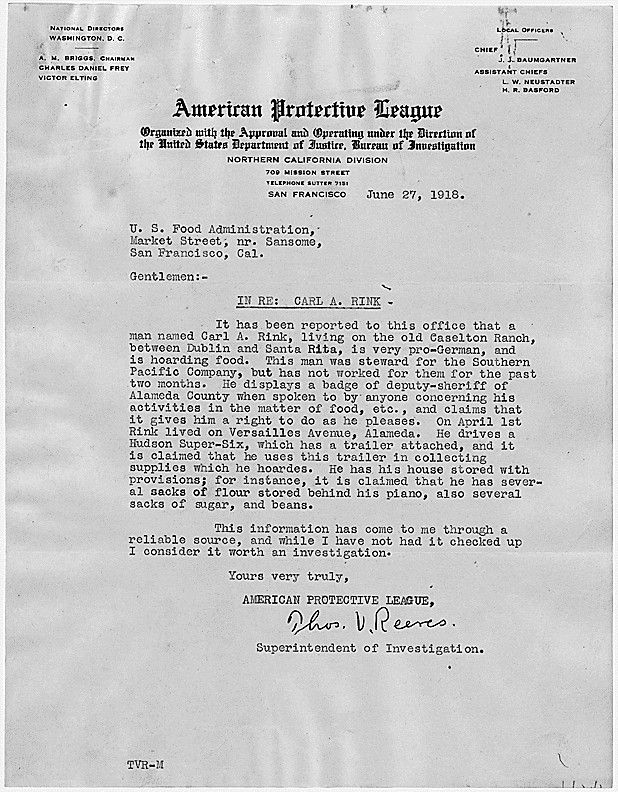
Document
School children holding one of the large heads of cabbage raised in the War garden of Public School 88
ca. 1918
The original caption for this photograph reads: School children holding one of the large heads of cabbage raised in the War garden of Public School 88, Borough of Queens, New York City. The garden covers a tract of 1< acres and yielded over $500 worth of produce.
This primary source comes from the Records of the War Department General and Special Staffs.
National Archives Identifier: 533646
Full Citation: Photograph 165-WW-172(1); School children holding one of the large heads of cabbage raised in the War garden of Public School 88; ca. 1918; American Unofficial Collection of World War I Photographs, 1917 - 1918; Records of the War Department General and Special Staffs, ; National Archives at College Park, College Park, MD. [Online Version, https://docsteach.org/documents/document/school-children-cabbage, April 23, 2024]School children holding one of the large heads of cabbage raised in the War garden of Public School 88
Page 1
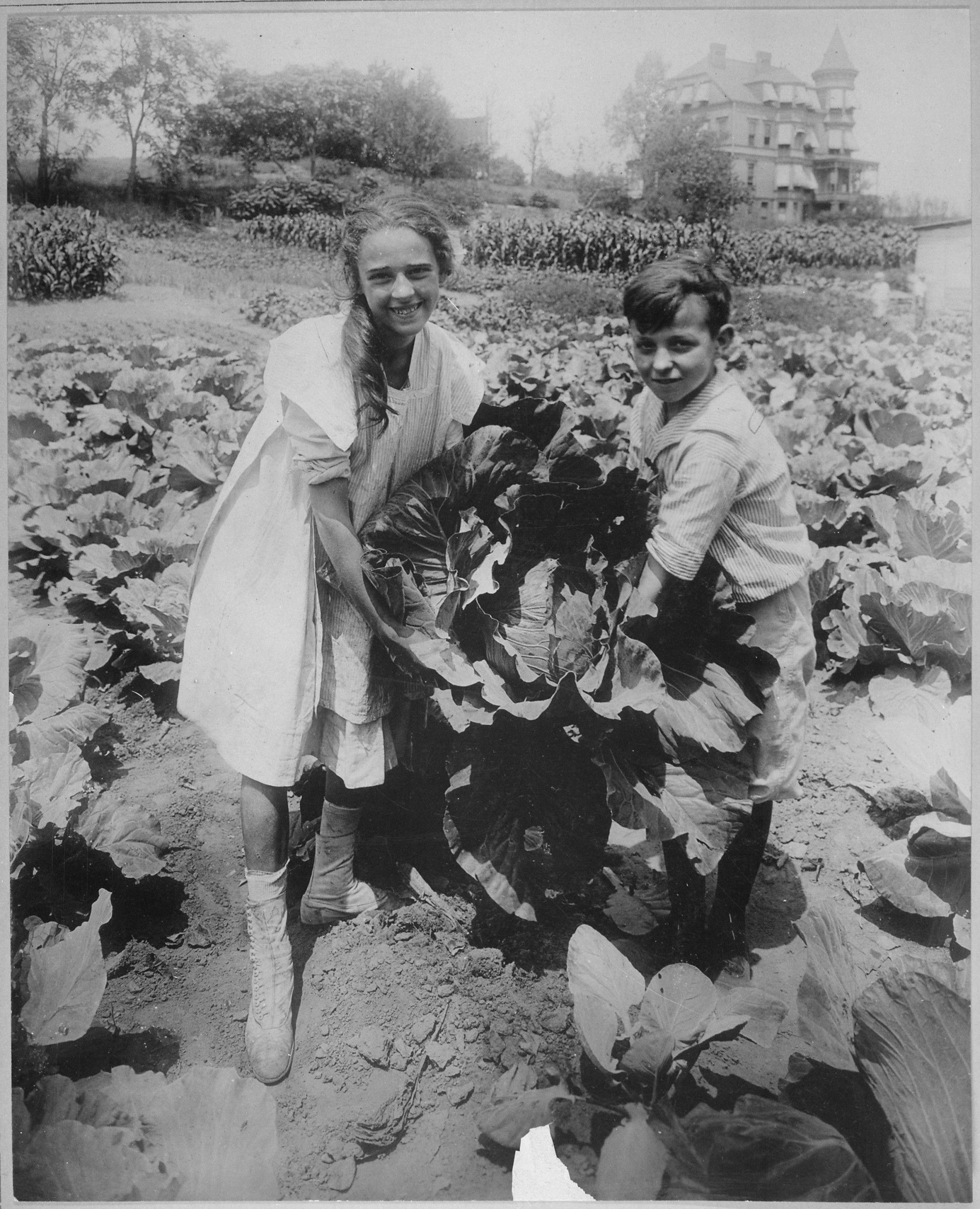
Document
Uncle Sam Says, Garden to Cut Food Costs
ca. 1917
With canned goods in short supply during World Wars I and II, people ate more fresh fruit and vegetables — many from their own back yards. It has been estimated that 40% of the fresh produce consumed during World War II was home grown.
This primary source comes from the Publications of the U.S. Government.
National Archives Identifier: 5711623
Full Citation: Uncle Sam Says, Garden to Cut Food Costs; ca. 1917; Publications of the U.S. Government, . [Online Version, https://docsteach.org/documents/document/uncle-sam-says-garden-to-cut-food-costs, April 23, 2024]Uncle Sam Says, Garden to Cut Food Costs
Page 1
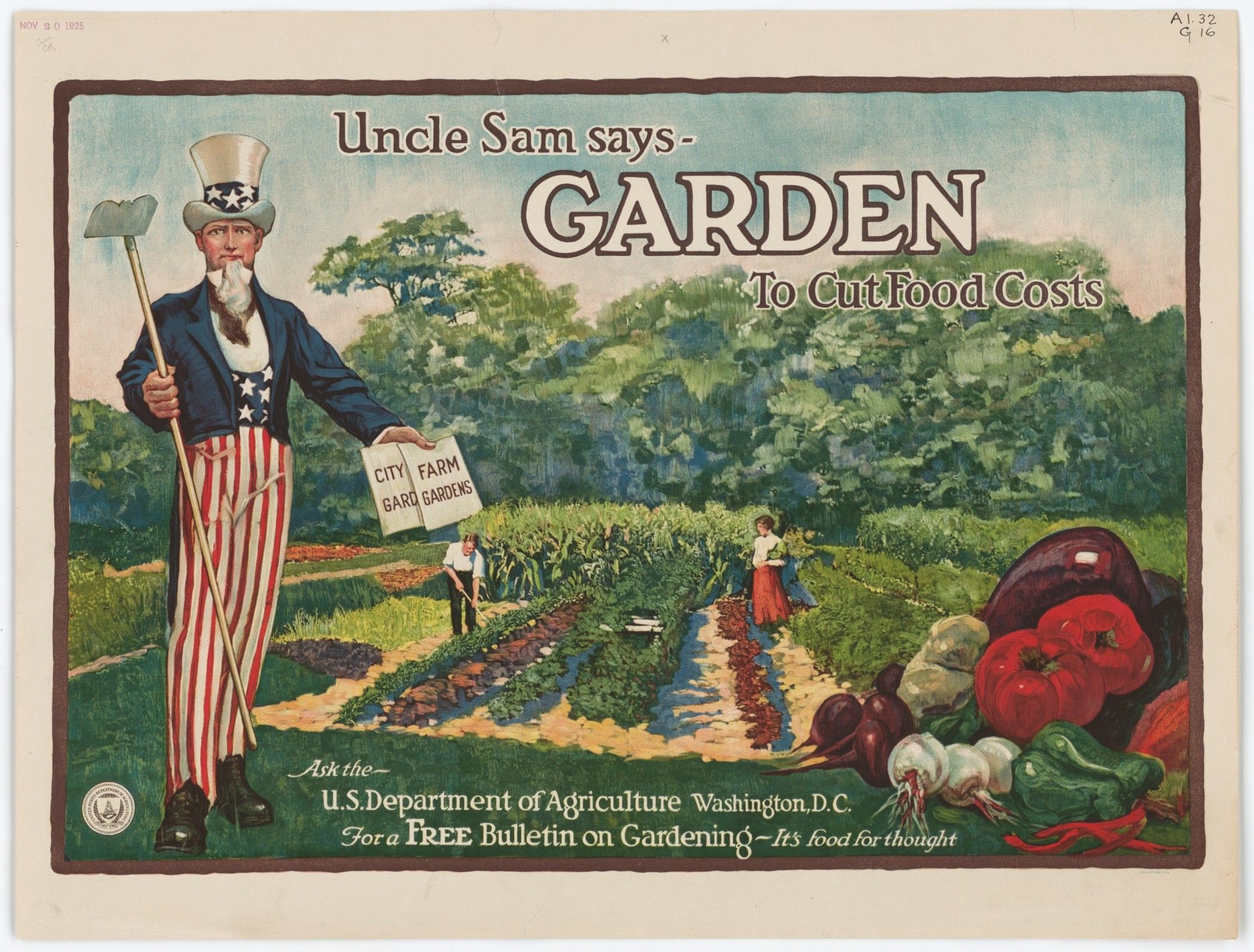
Document
Team Work Wins! Your work here makes their work over there possible. With your help they are invincible. Without it they are helpless. Whatever you make, machine gun or harness, cartridges or helmet,
ca. 1917 - ca. 1919
This primary source comes from the Records of the U.S. Food Administration.
National Archives Identifier: 512730
Full Citation: Team Work Wins! Your work here makes their work over there possible. With your help they are invincible. Without it they are helpless. Whatever you make, machine gun or harness, cartridges or helmet, ; ca. 1917 - ca. 1919; Records of the U.S. Food Administration, . [Online Version, https://docsteach.org/documents/document/team-work-wins-your-work-here-makes-their-work-over-there-possible-with-your-help-they-are-invincible-without-it-they-are-helpless-whatever-you-make-machine-gun-or-harness-cartridges-or-helmet-they-ar, April 23, 2024]Team Work Wins! Your work here makes their work over there possible. With your help they are invincible. Without it they are helpless. Whatever you make, machine gun or harness, cartridges or helmet,
Page 1
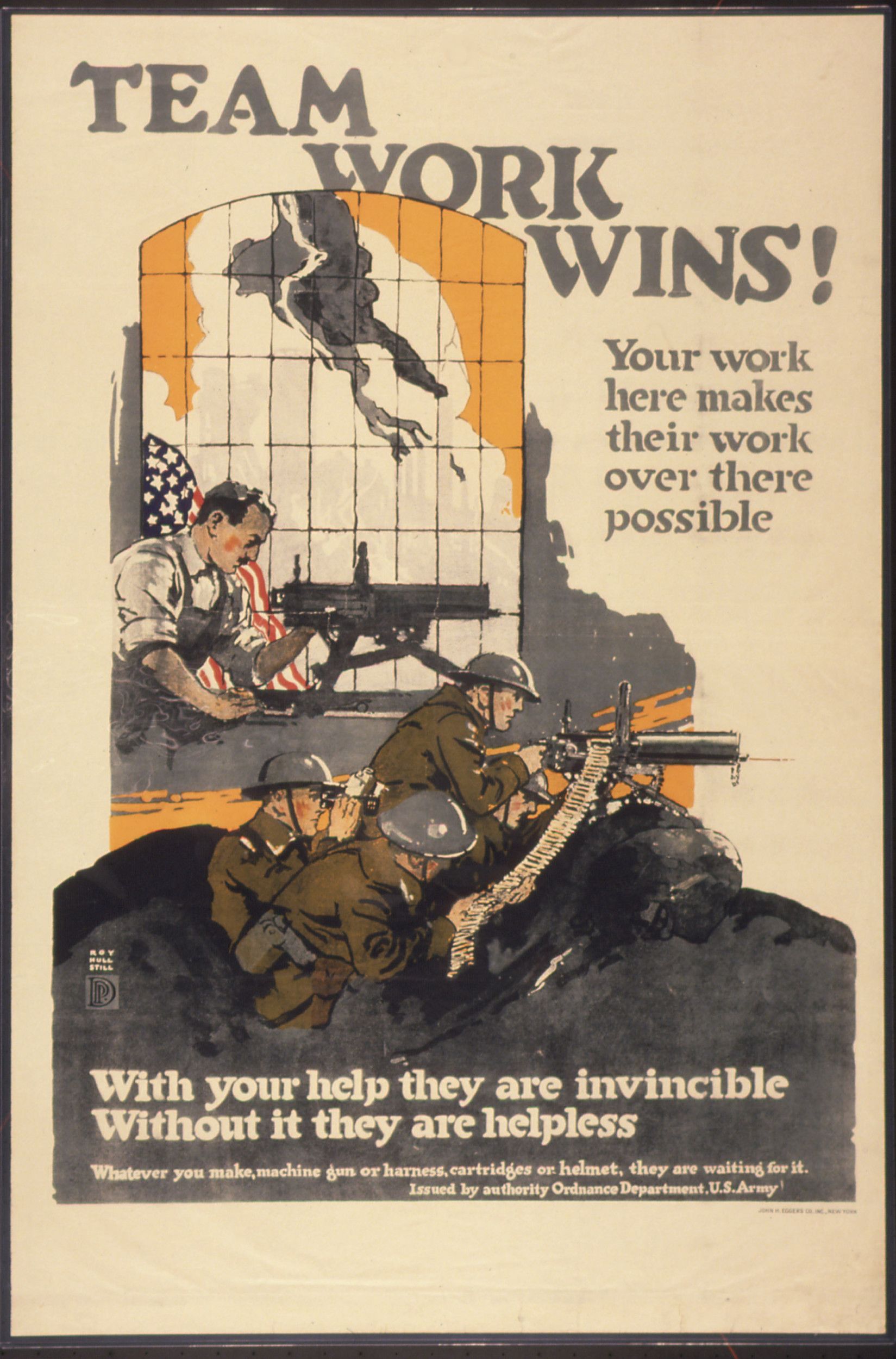
Document
Doctor Stephen S. Wise, Rabbi of the Free Synagogue, has become a laborer in the shipbuilding yards of the Luder Marine Construction Company, at Stanford, Connecticut, together with his eighteen year
7/1918
This primary source comes from the Records of the War Department General and Special Staffs.
National Archives Identifier: 533712
Full Citation: Doctor Stephen S. Wise, Rabbi of the Free Synagogue, has become a laborer in the shipbuilding yards of the Luder Marine Construction Company, at Stanford, Connecticut, together with his eighteen year ; 7/1918; Records of the War Department General and Special Staffs, . [Online Version, https://docsteach.org/documents/document/doctor-stephen-s-wise-rabbi-of-the-free-synagogue-has-become-a-laborer-in-the-shipbuilding-yards-of-the-luder-marine-construction-company-at-stanford-connecticut-together-with-his-eighteen-year-old-so, April 23, 2024]Doctor Stephen S. Wise, Rabbi of the Free Synagogue, has become a laborer in the shipbuilding yards of the Luder Marine Construction Company, at Stanford, Connecticut, together with his eighteen year
Page 1
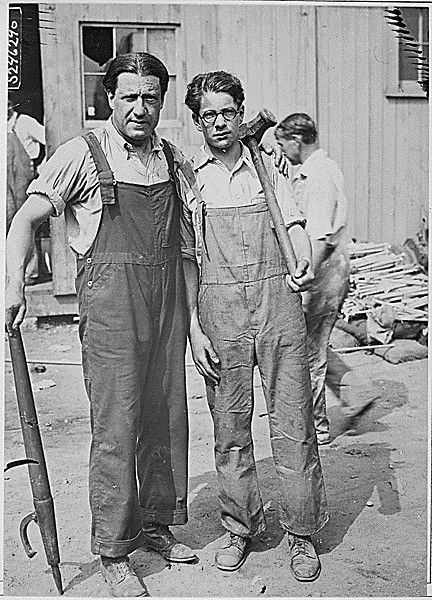
Document
Girls operate stock boards at Waldorf-Astoria. The Waldorf-Astoria Hotel is employing girls to operate tickers and stock exchange boards. The Waldorf is the first to employ girls in its various depart
11/12/1918
This primary source comes from the Records of the War Department General and Special Staffs.
National Archives Identifier: 533759
Full Citation: Girls operate stock boards at Waldorf-Astoria. The Waldorf-Astoria Hotel is employing girls to operate tickers and stock exchange boards. The Waldorf is the first to employ girls in its various depart; 11/12/1918; Records of the War Department General and Special Staffs, . [Online Version, https://docsteach.org/documents/document/girls-operate-stock-boards-at-waldorfastoria-the-waldorfastoria-hotel-is-employing-girls-to-operate-tickers-and-stock-exchange-boards-the-waldorf-is-the-first-to-employ-girls-in-its-various-department, April 23, 2024]Girls operate stock boards at Waldorf-Astoria. The Waldorf-Astoria Hotel is employing girls to operate tickers and stock exchange boards. The Waldorf is the first to employ girls in its various depart
Page 1
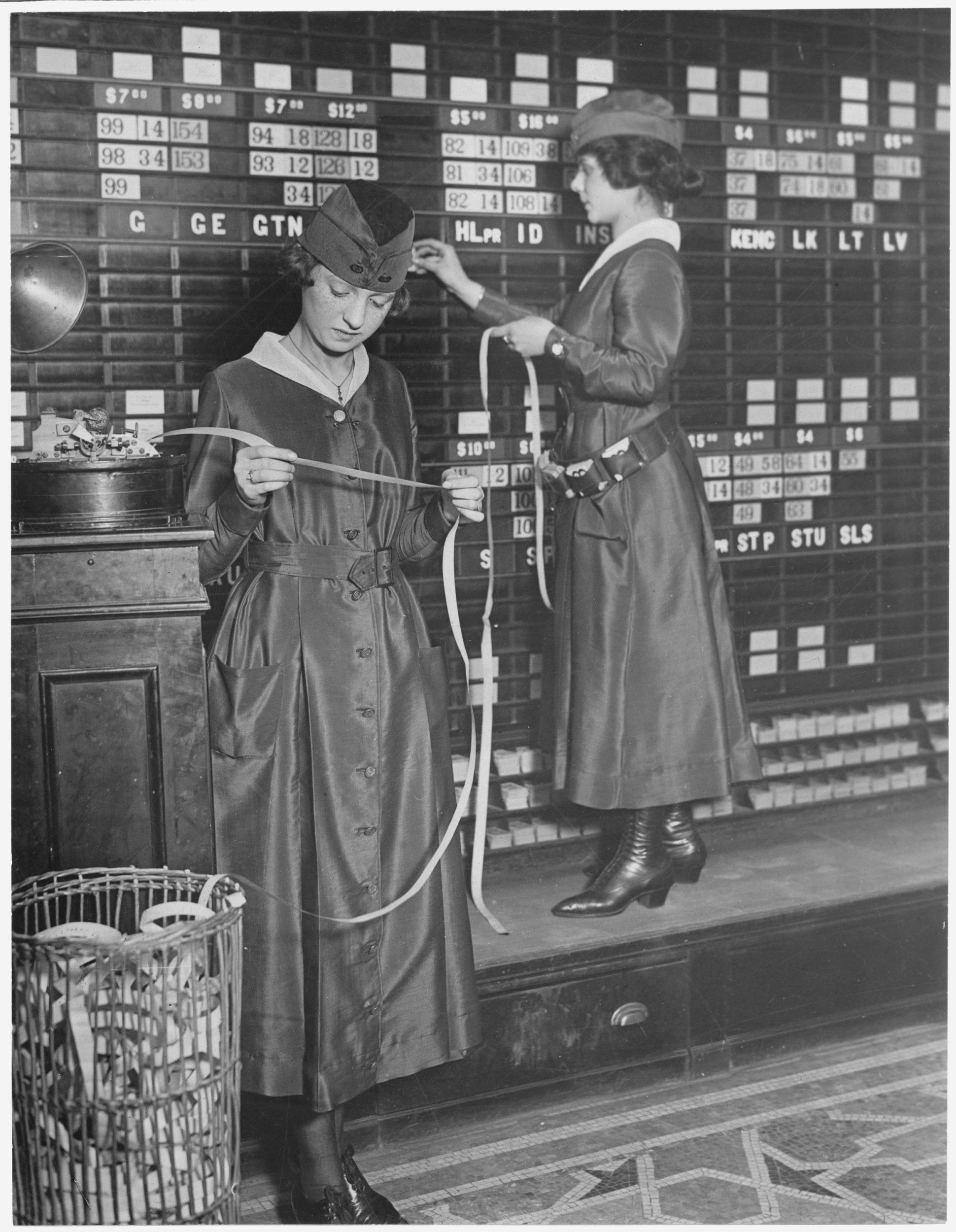
Document
Photograph of Women Rivet Heaters at Puget Sound Navy Yard
5/29/1919
Women riveters pose for the camera at the Navy Yard in Puget Sound, Washington. Taken on May 29, 1919, a generation before the more famous World War II image of “Rosie the Riveter,” this photograph shows women working in industrial jobs traditionally filled by men, just as women did during World War II.
This primary source comes from the Records of the Women's Bureau.
National Archives Identifier: 522877
Full Citation: Photograph 86-G-11F(7); Photograph of Women Rivet Heaters at Puget Sound Navy Yard; 5/29/1919; General Photographic File, 1893 - 1945; Records of the Women's Bureau, ; National Archives at College Park, College Park, MD. [Online Version, https://docsteach.org/documents/document/women-rivet-heaters, April 23, 2024]Photograph of Women Rivet Heaters at Puget Sound Navy Yard
Page 1
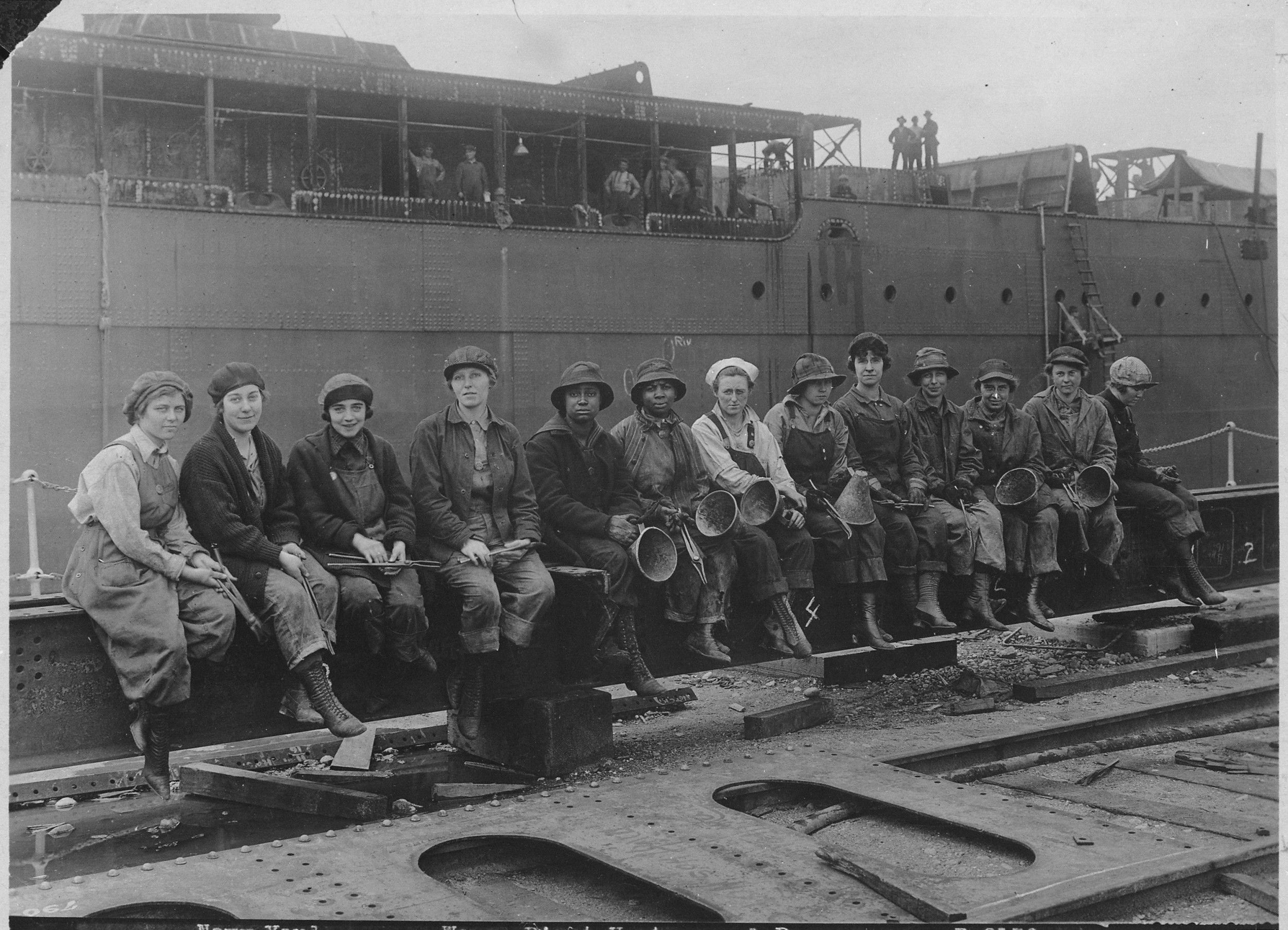
Document
World War I Draft Registration Card for George Herman Ruth
6/5/1917
This is the World War I draft card for George Herman Ruth, known as Babe Ruth. It indicates that he worked as a baseball player, employed at Fenway Park in Boston, Massachusetts.
On May 18, 1917, Congress passed the Selective Service Act, which authorized the Federal Government to temporarily expand the military through conscription. The act eventually required all men between the ages of 21 to 45 to register for military service. Under the act, approximately 24 million men registered for the draft. Of the total U.S. troops sent to Europe, 2.8 million men had been drafted, and 2 million men had volunteered.
This primary source comes from the Records of the Selective Service System (World War I).
National Archives Identifier: 641780
Full Citation: World War I Draft Registration Card for George Herman Ruth; 6/5/1917; Draft Registration Cards, 1917 - 1918; Records of the Selective Service System (World War I), ; National Archives at Atlanta, Morrow, GA. [Online Version, https://docsteach.org/documents/document/draft-card-babe-ruth, April 23, 2024]World War I Draft Registration Card for George Herman Ruth
Page 1
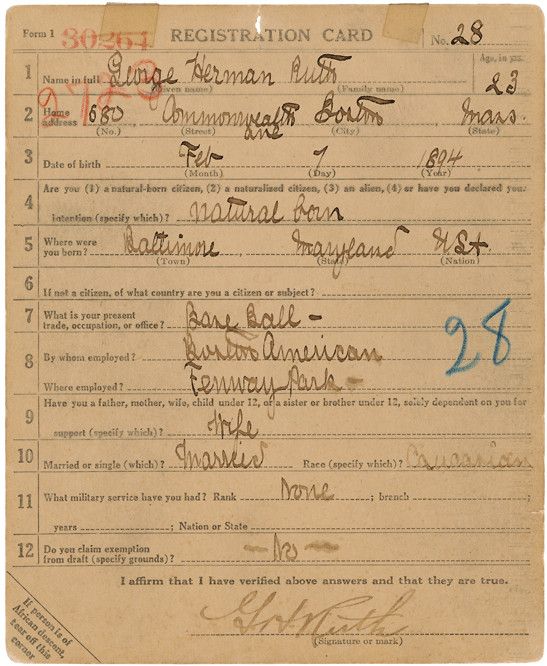
World War I Draft Registration Card for George Herman Ruth
Page 2
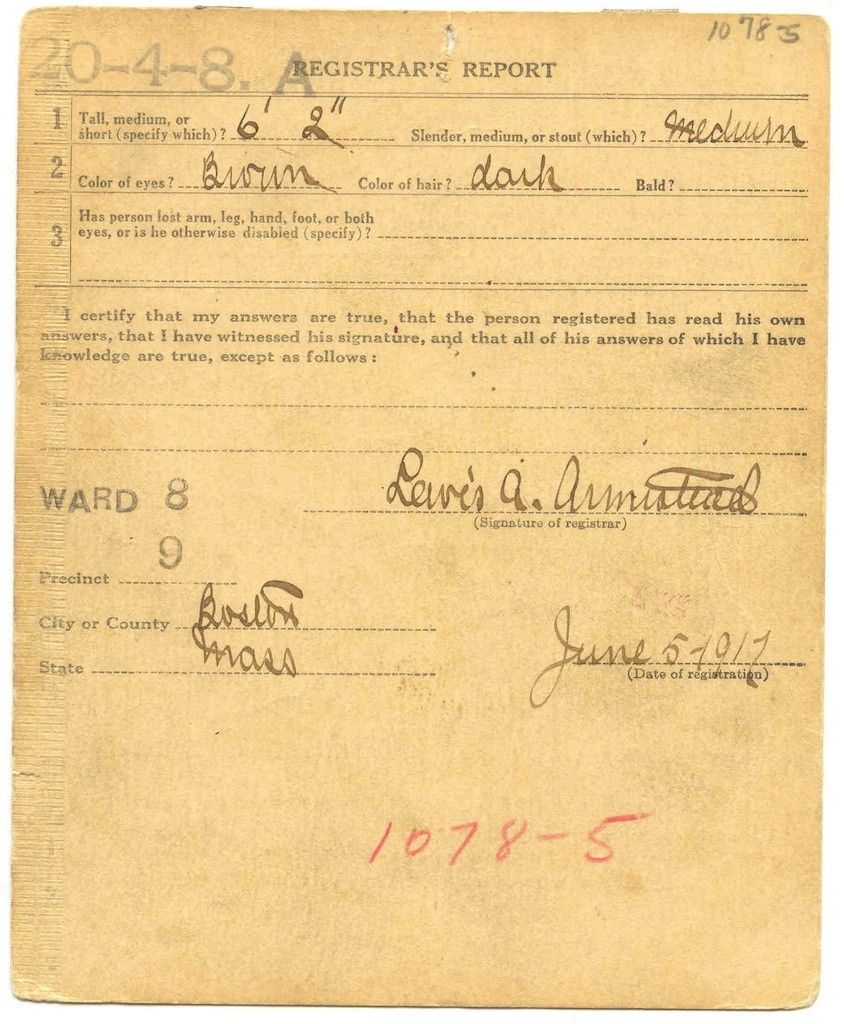
Document
Has eleven sons in service. Ike Sims of Atlanta, Georgia, 87 years old, has eleven sons in the service. . .
ca. 1917 - 1919
This primary source comes from the Records of the War Department General and Special Staffs.
National Archives Identifier: 533583
Full Citation: Has eleven sons in service. Ike Sims of Atlanta, Georgia, 87 years old, has eleven sons in the service. . .; ca. 1917 - 1919; Records of the War Department General and Special Staffs, . [Online Version, https://docsteach.org/documents/document/has-eleven-sons-in-service-ike-sims-of-atlanta-georgia-87-years-old-has-eleven-sons-in-the-service-, April 23, 2024]Has eleven sons in service. Ike Sims of Atlanta, Georgia, 87 years old, has eleven sons in the service. . .
Page 2
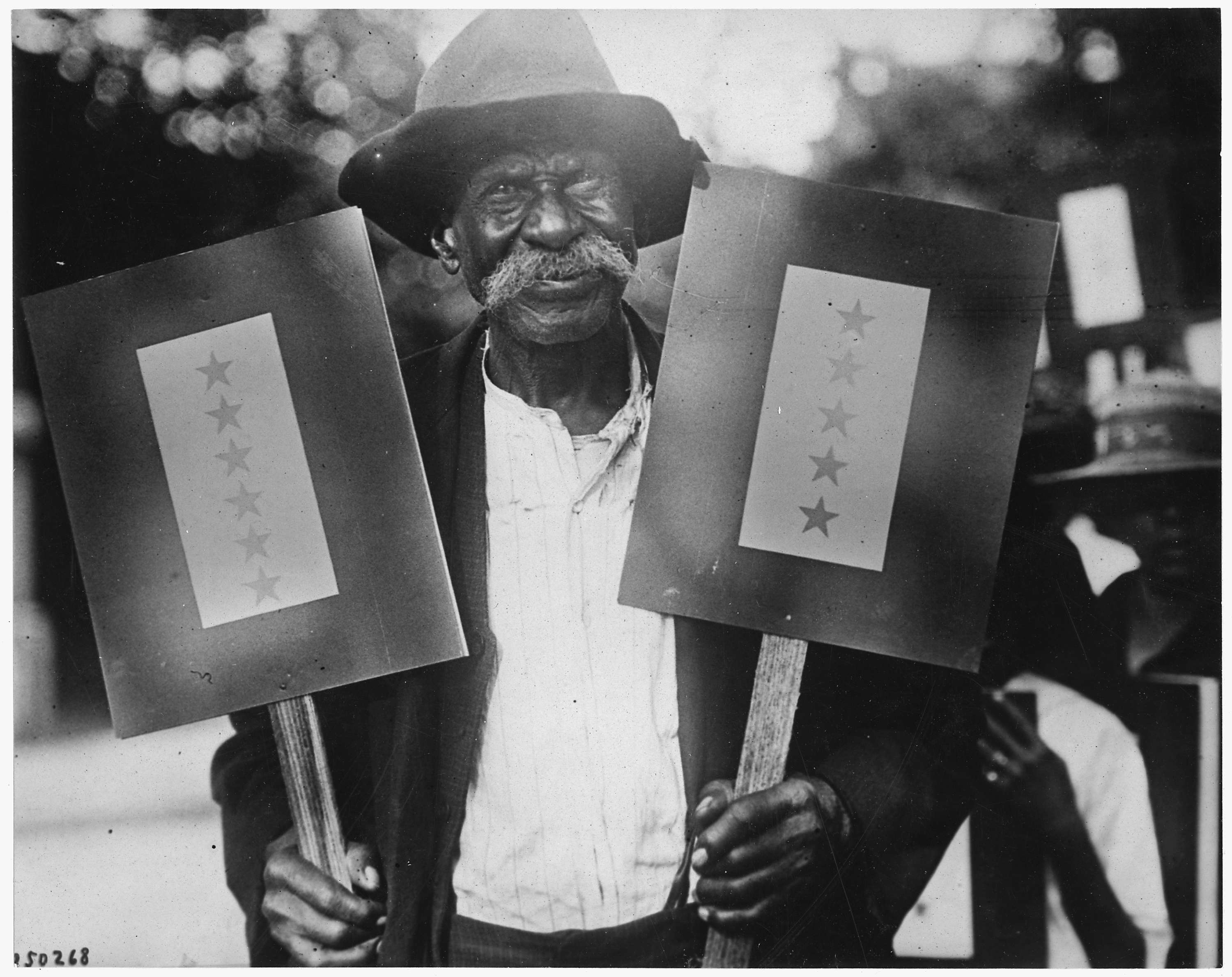
Document
You Buy A Liberty Bond. Lest I perish. Get Behind The Government. Liberty Loan of 1917.
1917
This poster, created by Charles R. Macaulay for the Advertising Section of the Educational Division of the U.S. Food Administration for the Liberty Loan of 1917 challenges viewers to purchase Liberty Bonds to support the war effort. Macaulay, a noted editorial cartoonist who created the Big Stick drawings during the Presidency of Theodore Roosevelt, went on to win a Pulitzer Prize in 1930.
This primary source comes from the Records of the U.S. Food Administration.
National Archives Identifier: 512670
Full Citation: Poster 4-P-232; You Buy A Liberty Bond. Lest I perish. Get Behind The Government. Liberty Loan of 1917.; 1917; World War I Posters, 1917 - 1919; Records of the U.S. Food Administration, ; National Archives at College Park, College Park, MD. [Online Version, https://docsteach.org/documents/document/you-buy-a-liberty-bond, April 23, 2024]You Buy A Liberty Bond. Lest I perish. Get Behind The Government. Liberty Loan of 1917.
Page 1
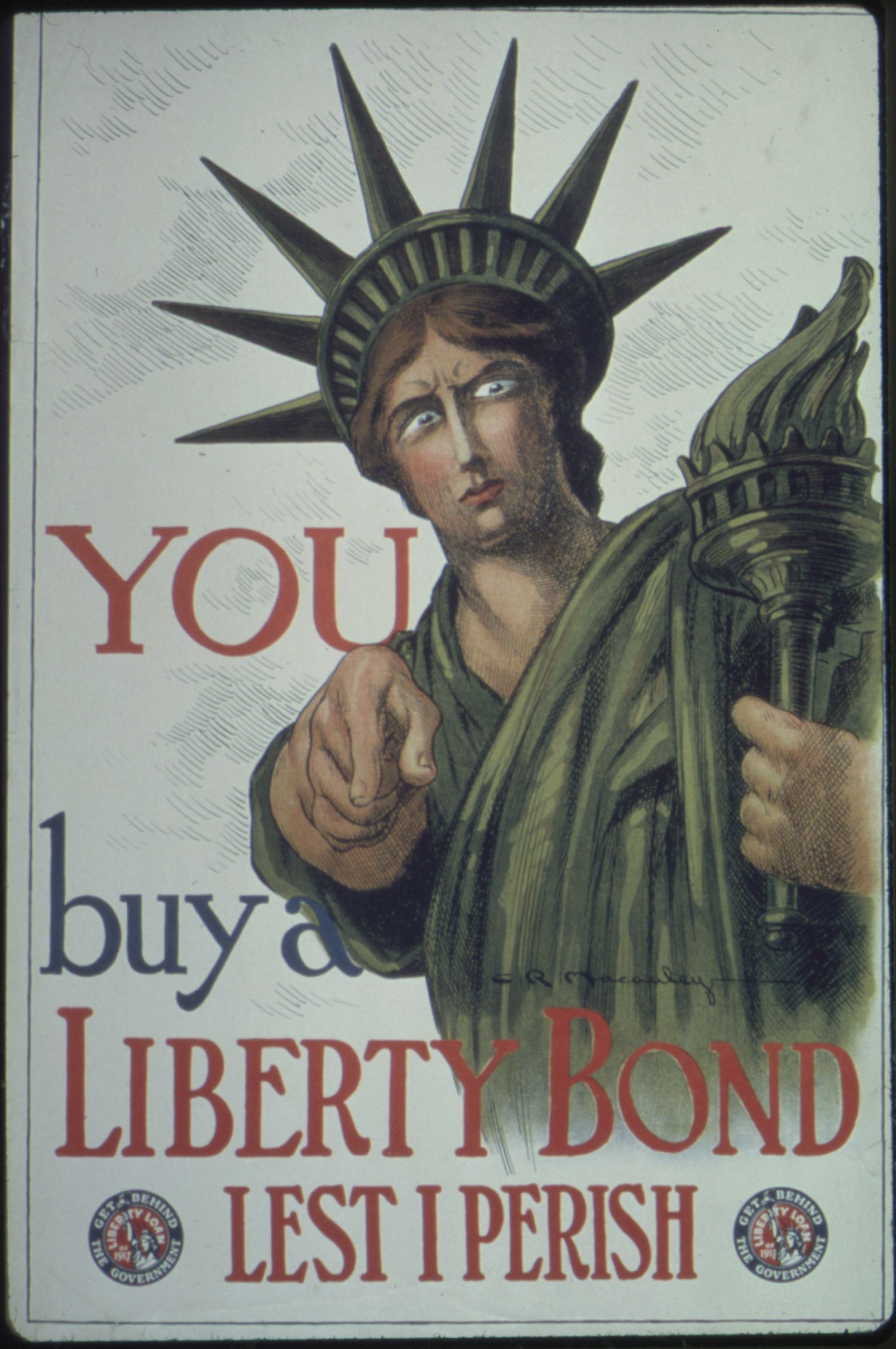
Document
All About W.S.S. What are they?...Why Should I Buy Them?...How Can I Buy Them?... Where Can I Buy Them?... Every Stamp helps to Save a Life, Every Stamp Helps To End The War...
ca. 1917-ca. 1919
This primary source comes from the Records of the U.S. Food Administration.
National Archives Identifier: 512717
Full Citation: All About W.S.S. What are they?...Why Should I Buy Them?...How Can I Buy Them?... Where Can I Buy Them?... Every Stamp helps to Save a Life, Every Stamp Helps To End The War...; ca. 1917-ca. 1919; Records of the U.S. Food Administration, . [Online Version, https://docsteach.org/documents/document/all-about-wss-what-are-theywhy-should-i-buy-themhow-can-i-buy-them-where-can-i-buy-them-every-stamp-helps-to-save-a-life-every-stamp-helps-to-end-the-war, April 23, 2024]All About W.S.S. What are they?...Why Should I Buy Them?...How Can I Buy Them?... Where Can I Buy Them?... Every Stamp helps to Save a Life, Every Stamp Helps To End The War...
Page 1
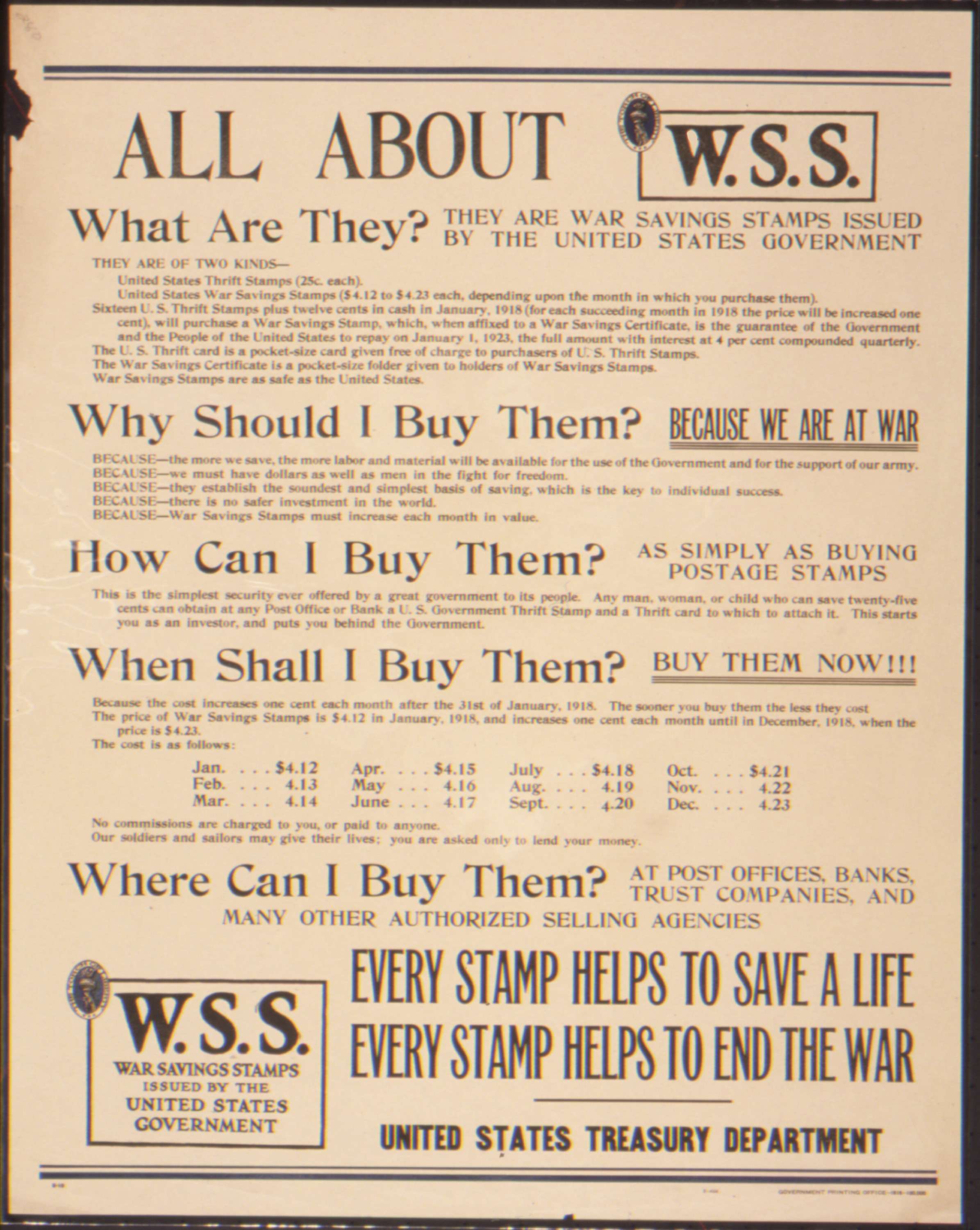
Document
Eat more corn, oats, and rye products- fish and poultry- fruits, vegetables, and potatoes, Baked, Broiled, and Boiled Foods. Eat less wheat, wheat sugar and fats to save for the army and our allies.
ca. 1918
This poster reads: "Eat more corn, oats, and rye products — fish and poultry — fruits, vegetables, and potatoes, baked, broiled, and boiled Foods. Eat less wheat, wheat sugar and fats to save for the Army and our allies."
Transcript
U.S. Food AdministrationEat more corn, oats, and rye products — fish and poultry — fruits, vegetables, and potatoes, baked, broiled, and boiled Foods. Eat less wheat, wheat sugar and fats to save for the Army and our allies.
This primary source comes from the Records of the U.S. Food Administration.
National Archives Identifier: 512500
Full Citation: Poster 4-P-61; Eat more corn, oats, and rye products- fish and poultry- fruits, vegetables, and potatoes, Baked, Broiled, and Boiled Foods. Eat less wheat, wheat sugar and fats to save for the army and our allies.; ca. 1918; World War I Posters, 1917 - 1919; Records of the U.S. Food Administration, ; National Archives at College Park, College Park, MD. [Online Version, https://docsteach.org/documents/document/eat-more-corn-oats-rye, April 23, 2024]Eat more corn, oats, and rye products- fish and poultry- fruits, vegetables, and potatoes, Baked, Broiled, and Boiled Foods. Eat less wheat, wheat sugar and fats to save for the army and our allies.
Page 1
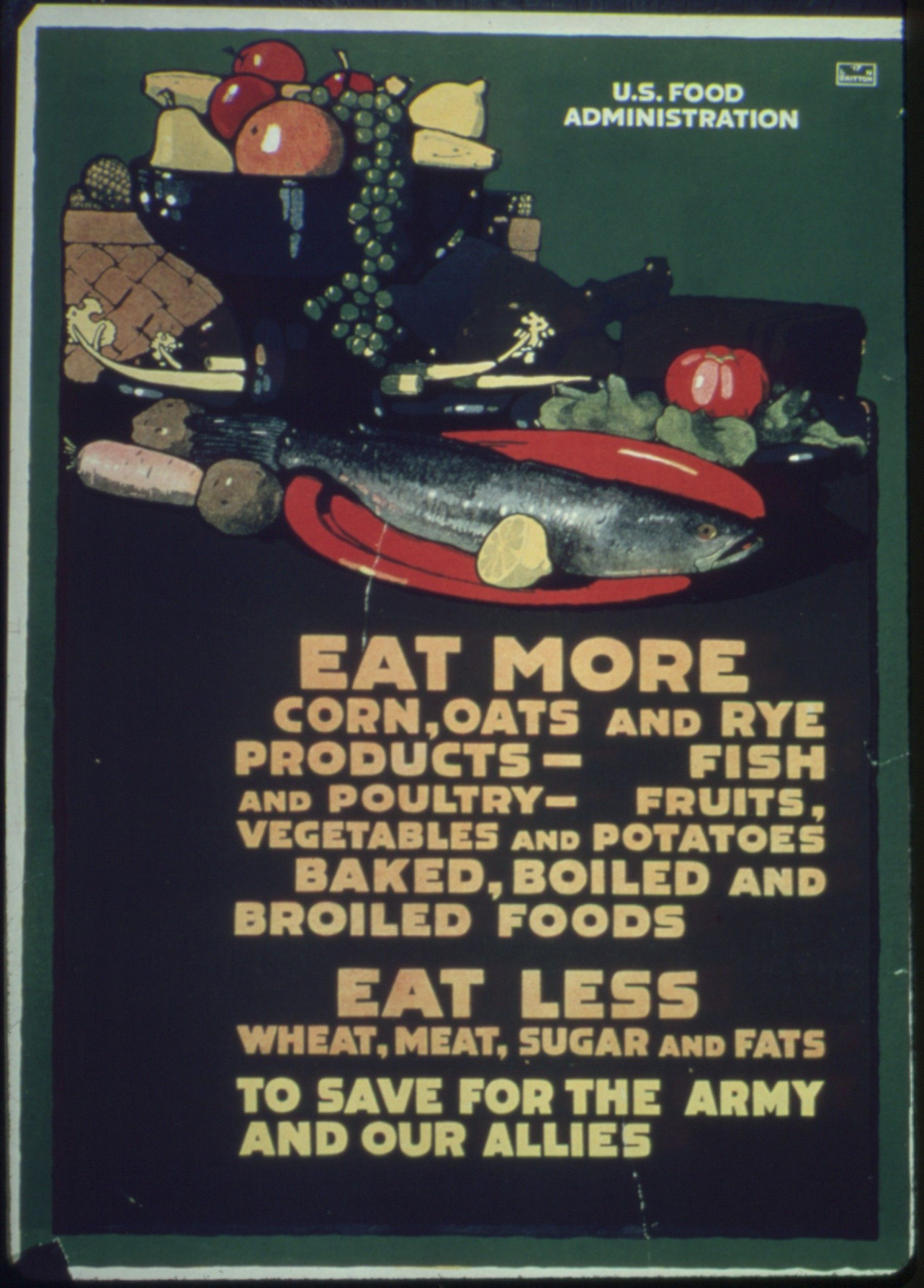
Document
Little Americans. Do Your Bit. Eat Oatmeal- Corn meal mush- Hominy- other corn cereals- and rice with milk. Save the Wheat for our Soldiers. Leave Nothing On Your Plate.
ca. 1918
This poster reads: "Little Americans. Do Your Bit. Eat Oatmeal- Corn meal mush- Hominy- other corn cereals- and rice with milk. Save the Wheat for our Soldiers. Leave Nothing On Your Plate."
No child was too young to contribute to the war effort during World War I. This poster explains how “Little Americans” could do their part.
No child was too young to contribute to the war effort during World War I. This poster explains how “Little Americans” could do their part.
This primary source comes from the Records of the U.S. Food Administration.
National Archives Identifier: 512566
Full Citation: Poster 4-P-127; Little Americans. Do Your Bit. Eat Oatmeal- Corn meal mush- Hominy- other corn cereals- and rice with milk. Save the Wheat for our Soldiers. Leave Nothing On Your Plate.; ca. 1918; World War I Posters, 1917 - 1919; Records of the U.S. Food Administration, ; National Archives at College Park, College Park, MD. [Online Version, https://docsteach.org/documents/document/little-americans-do-your-bit, April 23, 2024]Little Americans. Do Your Bit. Eat Oatmeal- Corn meal mush- Hominy- other corn cereals- and rice with milk. Save the Wheat for our Soldiers. Leave Nothing On Your Plate.
Page 1
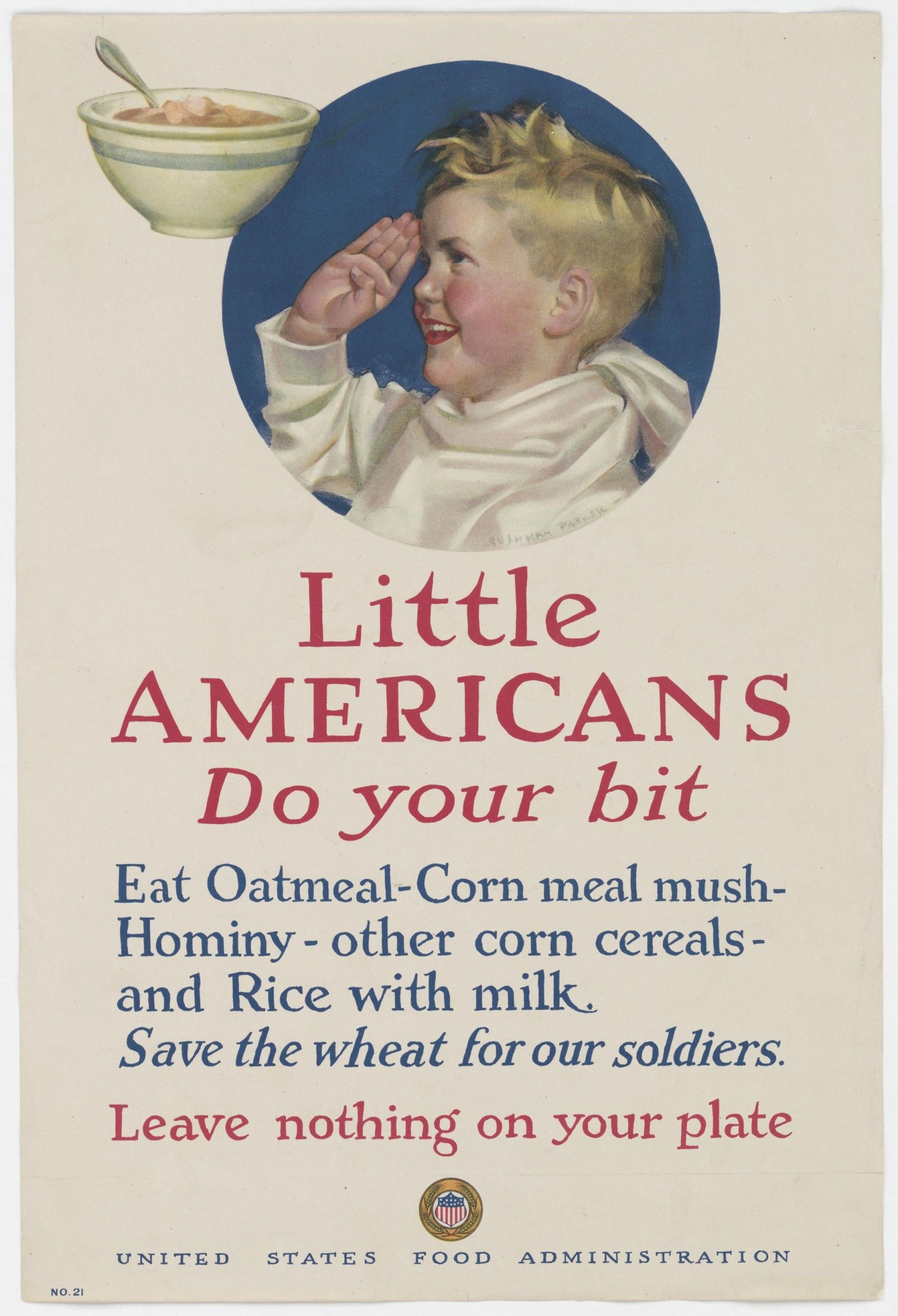
Document
Photograph of Bicycle Boat Promoting Food Conservation in Calexico, California.
1918
During World War I, the U.S. Food Administration under Herbert Hoover urged Americans to conserve food. This photograph recorded one patriotic boy’s efforts to get out the message.
This primary source comes from the Records of the U.S. Food Administration.
National Archives Identifier: 595357
Full Citation: Photograph of Bicycle Boat Promoting Food Conservation in Calexico, California.; 1918; Records of the U.S. Food Administration, . [Online Version, https://docsteach.org/documents/document/photograph-of-bicycle-boat-promoting-food-conservation-in-calexico-california, April 23, 2024]Photograph of Bicycle Boat Promoting Food Conservation in Calexico, California.
Page 1
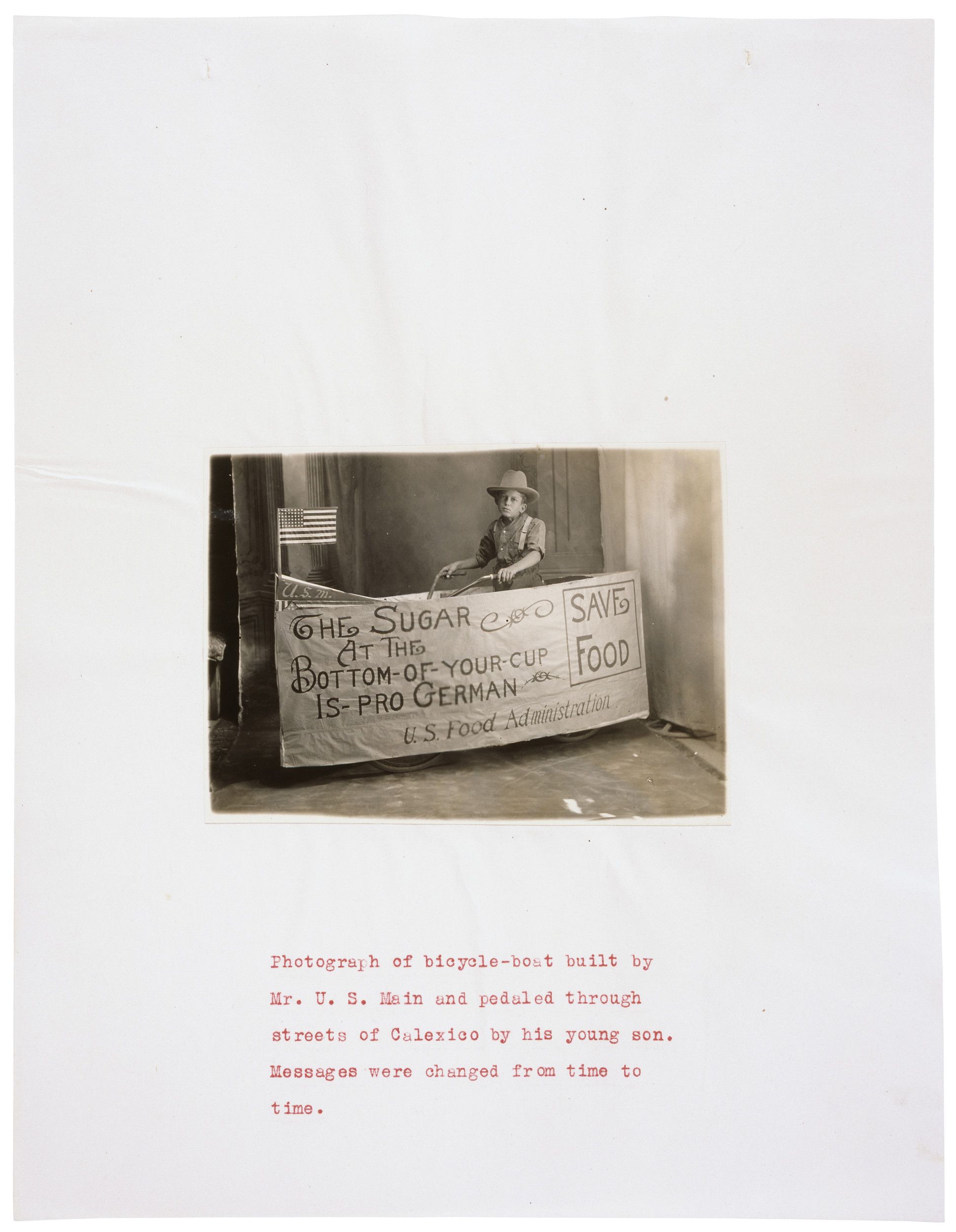
Document
Sugar. 1- none on fruits, 2- none in desserts, 3- less on cereals, 4- less in coffee or tea, 5- less in preserving, 6- less cake and candy, 7- use other sweeteners. Save It.'
ca. 1917 - 1919
This primary source comes from the Records of the U.S. Food Administration.
National Archives Identifier: 512507
Full Citation: Sugar. 1- none on fruits, 2- none in desserts, 3- less on cereals, 4- less in coffee or tea, 5- less in preserving, 6- less cake and candy, 7- use other sweeteners. Save It.'; ca. 1917 - 1919; Records of the U.S. Food Administration, . [Online Version, https://docsteach.org/documents/document/sugar-1-none-on-fruits-2-none-in-desserts-3-less-on-cereals-4-less-in-coffee-or-tea-5-less-in-preserving-6-less-cake-and-candy-7-use-other-sweeteners-save-it, April 23, 2024]Sugar. 1- none on fruits, 2- none in desserts, 3- less on cereals, 4- less in coffee or tea, 5- less in preserving, 6- less cake and candy, 7- use other sweeteners. Save It.'
Page 2
